Reconciliation News
Stories about Australia’s journey to equality and unity

Hooked on Reconciliation
Fishing for understanding
Ciao and Kaya Italian and Noongar come together at school
Jacara Egan blazing a trail for women in sports
NOW MORE THAN EVER STAND UP FOR RECONCILIATION
May 2024 51
Reconciliation News is published by Reconciliation Australia in May and October each year. Its aim is to inform and inspire readers with stories relevant to the ongoing reconciliation process between Aboriginal and Torres Strait Islander Peoples and non-Indigenous Australians.
JOIN THE CONVERSATION CONTACT US
reconciliation.org.au
enquiries@reconciliation.org.au
02 6153 4400
Reconciliation Australia acknowledges the Traditional Owners of Country throughout Australia and recognises their continuing connection to lands, waters and communities. We pay our respects to Aboriginal and Torres Strait Islander cultures, and to Elders past and present.
facebook.com/ReconciliationAus
Cover image:
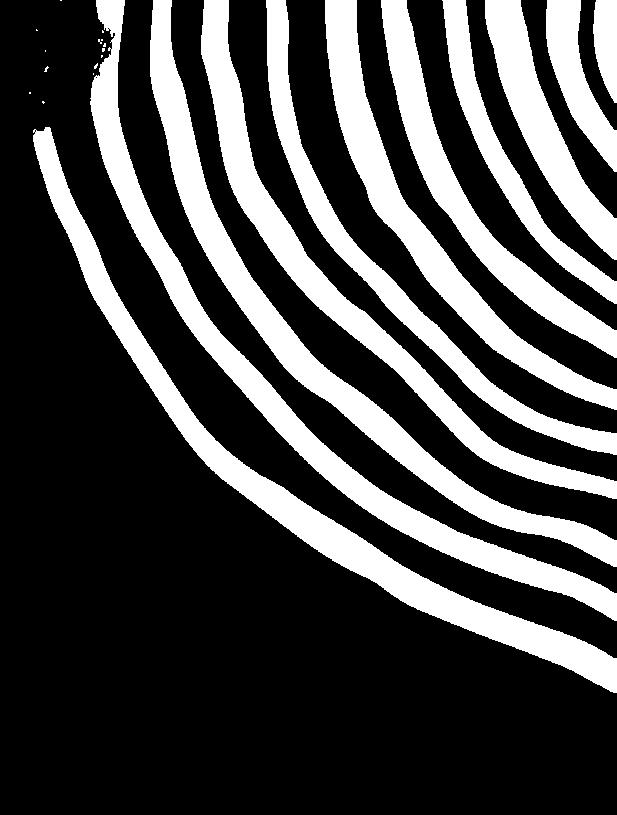
twitter.com/RecAustralia @reconciliationaus
Reconciliation Australia
Reconciliation Australia is an independent, not-for-profit organisation promoting reconciliation by building relationships, respect and trust between the wider Australian community and Aboriginal and Torres Strait Islander peoples. Visit reconciliation.org.au to find out more.
From the National Reconciliation Week video filmed in Meanjin-Brisbane and produced by Carbon Creative. Read more about the Now More Than Ever theme on page 8.



8 National Reconciliation Week 2024
The theme for 2024, Now More Than Ever, is a rallying cry to reconciliation supporters across the country.
10 Someone else like me
Muthi Muthi and Gunditjmara athlete Jacara Egan is decolonising space for Aboriginal women in sport.
12 Hooked on reconciliation
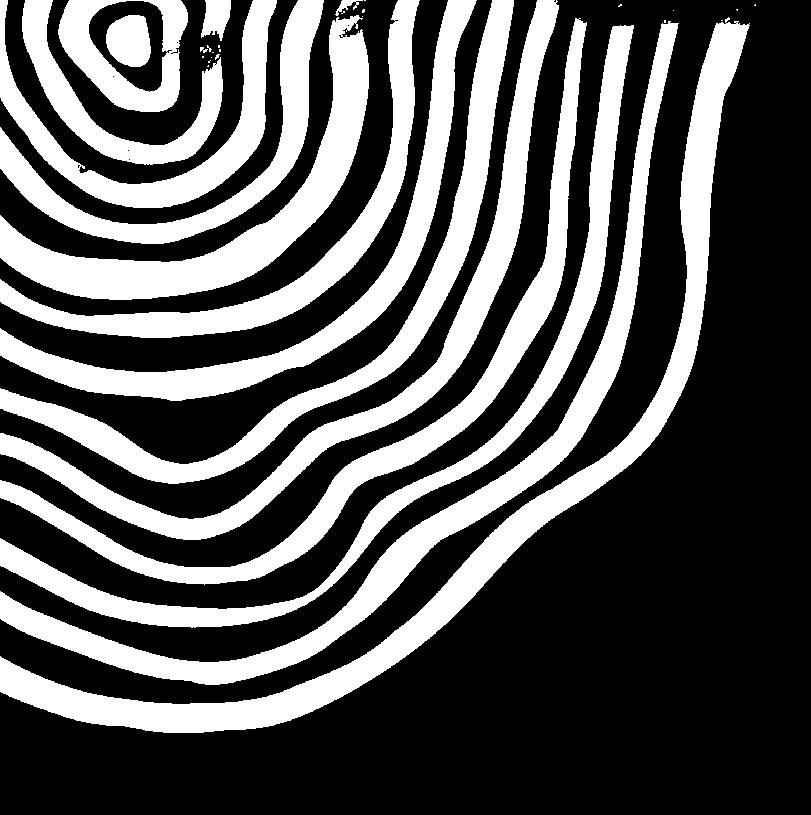
Yorta Yorta, Waddi, Wemba, and Burapa man Freddy Morrison is pushing for reconciliation and saving the burnanga on the Dungala (Murray River).
14 Kaya and ciao from Winterfold school
A school in Western Australia has been recognised for its Noongar language and Italian community connections.
20 Karen Mundine: It’s time to stand up Now more than ever, there is an urgency to reconciliation. Karen Mundine galvanises the post-Referendum cause and calls on us to stand up and be counted.
22 Racist heart of Australian policing Coronial inquests are exposing the systemic racism in police forces across Australia. Kurin Minang Noongar woman Dr Hannah McGlade says reform will come with accountability.

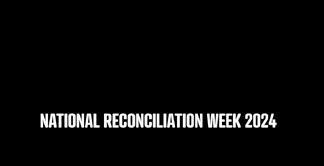
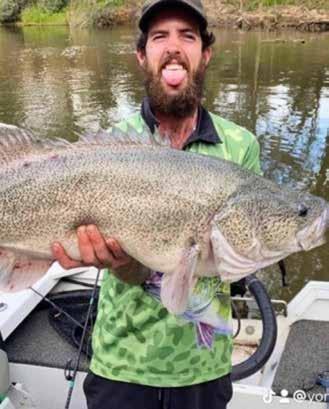
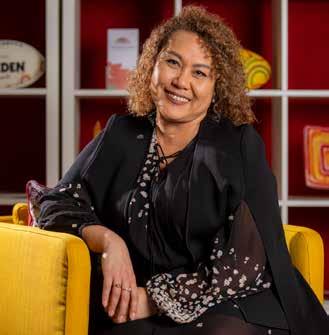
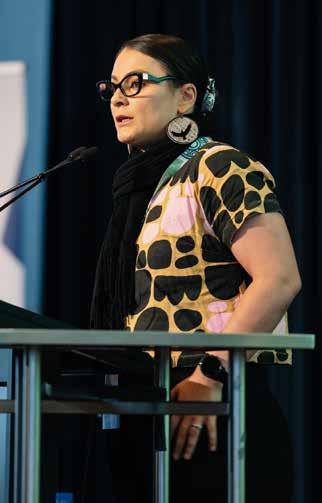

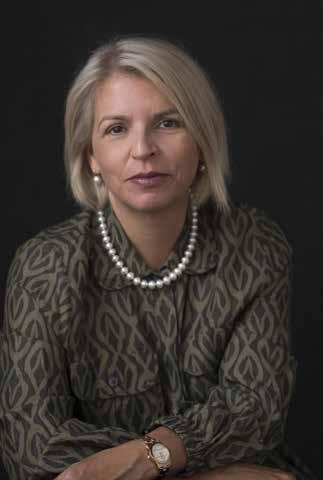


CONTENTS FEATURES
REGULARS
From the CEO 5 Calendar 6 Reconciliation recap 30 Look for a book! 12 14 10 08 20 22
4
3 Issue no. 51 / May 2024
Images: 10: Jacara Egan is a trailblazer for women in sport. Photo: Supplied. 12: Petey Lumsden fishing for cod on the Dungala. Photo: Freddy Morrison. 14: Children at Winterfold Primary School are learning Noongar language. Photo: Tom Hoy, Wirrim Media. 20: Karen Mundine is asking us to stand up and be counted. Photo: Joseph Mayers. 22: Dr Hannah McGlade wants reform in Australian police forces. Photo: Supplied.
FROM THE CEO

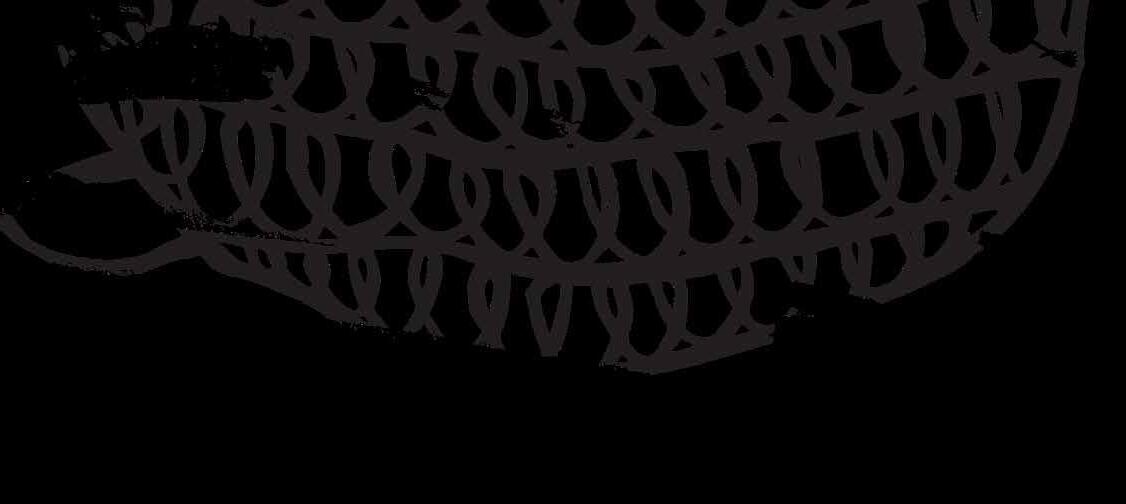
This edition of Reconciliation News is all about overcoming hesitancy, unknowns or fears to commit to your place in the reconciliation movement, now more than ever.
In April we launched a new piece of research on truth-telling, Coming to terms with the past?
Barriers and enablers to truth-telling and strategies to promote historical acceptance.
Commissioned by Reconciliation Australia and produced by UNSW’s Indigenous Land and Justice Research Group, the report provides insights into what drives non-Indigenous and Aboriginal and Torres Strait Islander people to and from truth-telling.
One of the report’s First Nations interviewees spoke about the indivisibility of truth-telling from her identity: ‘If I really want to think about [truth-telling], it is every day and in every conversation we have.’
CEO Karen Mundine. Photo: Joseph Mayers
‘I can’t take my culture, my lived experience, out of my words... my personal integrity as an Aboriginal woman is fundamental and guides how I say and what I say and how I engage.’
For some non-Indigenous participants, however, things were less straightforward. As one interviewee stated, ‘there are a lot of unknowns about truth-telling for non-Indigenous Australians and a fear as to whether it is traumatic and what the etiquette is around joining in.’
Rather than be concerned about the gap between First Nations and non-Indigenous respondents, the report shows us that by recognising these fears and unknowns, we can chart tangible, practical ways forward.
With truth-telling as with reconciliation, sometimes the first step is committing to your place in the process: as one interviewee said, ‘you have to decide what your role can be... Even if it’s only a small one, that’s better than doing nothing at all.’
Jacara Egan (10) was once the only young Aboriginal woman on her sports team – now she’s hitting it out of the park as a role model for others. Hooked on reconciliation (12) reveals how one man’s passion is building bridges for reconciliation and conservation. A school in Western Australia has been celebrated for integrating Noongar language into the classroom, creating unforeseen connections with its Italian community (14). Dr Hannah McGlade tells us what needs to be reformed to tackle systemic racism in Australia’s police forces (22). Professor Heidi Norman and Dr Anne Maree Payne (24) reveal more about the findings of the UNSW truth-telling report (24). And I write about the principles and motivation behind the National Reconciliation Week 2024 theme, Now more than ever (20).
In all of these stories you will find practical, real-world examples of people realising their unique position to create a difference – in their communities, on the sports field, by the Murray River, or in the classroom – and owning it, to great success.
This National Reconciliation Week, use these role models as inspiration to help you commit to your role in defending and advancing the rights of Aboriginal and Torres Strait Islander people.
Karen Mundine Chief Executive Officer
4 Issue no. 51 / May 2024
UPCOMING EVENTS

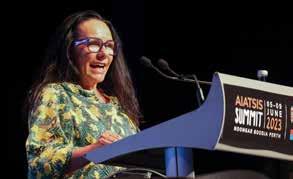
AIATSIS Summit
3–7 June
Following last year’s success, the AIATSIS 2024 Summit will once again bring together Aboriginal and Torres Strait Islander people, communities, academics, and cultural stakeholders with government for a unique forum. This year – AIATSIS’ sixtieth –the Summit is convened in partnership with the First People’s Assembly of Victoria, the democratic voice for Treaty in Victoria.
This year’s theme, Celebrating Indigenous Brilliance: Then and Now, toasts the resilience of Aboriginal and Torres Strait Islander culture; how these cultures have withstood, adapted, and evolved alongside and in response to the world around them. Participate in conversations on intergenerational wisdom of First Nations Elders, connection to Country and the right of Traditional Owners to recognition, representation, and Native Title.
aiatsis.gov.au/whats-new/ events/aiatsis-summit-2024
The Hon. Linda Burney MP opened the 2023 AIATSIS Summit.
Photo: AIATSIS
NAIDOC Week
7–14 July
The first week in July is NAIDOC Week! NAIDOC Week is a time to celebrate Aboriginal and Torres Strait Islander cultures and achievements, and to recognise the history of the oldest living culture on Earth.
The theme for NAIDOC Week 2024 is Keep the Fire Burning! Blak, Loud and Proud. National NAIDOC
Committee Co-Chair Steven Satour says, ‘This theme calls for a reclamation of our narratives, an amplification of our voices, and an unwavering commitment to justice and equality.’
Fire represents the enduring strength and vitality of First Nations cultures.
‘We honour the flame of the fire, kindling the sparks of pride and unity, igniting a renewed commitment to acknowledging, preserving, and sharing the cultural heritage that enriches our nation,’ says Co-Chair Aunty Dr Lynette Riley.
naidoc.org.au
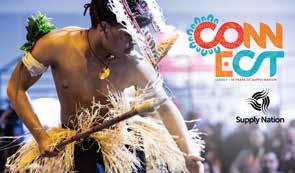
Connect 2024
28–29 August
Supply Nation works to achieve a prosperous, vibrant, and sustainable Indigenous business sector, and their flagship event – Connect – is marking 15 years in 2024. First Nations businesses will gather to demonstrate the success of the sector and to foster new and innovative opportunities.
This year, Australia’s leading event for Aboriginal and Torres Strait Islander businesses will be held on the lands of the Turrbal and Jagera peoples in Meanjin (Brisbane). It will bring diverse voices together to ignite important conversations at the Knowledge Forum, connect businesses with motivated buyers at the Indigenous Business Tradeshow, and celebrate the Supplier Diversity Award 2024 finalists and winners at the Gala Awards Dinner. connect.supplynation.org.au
Photo: Jillian Mundy, courtesy of Supply Nation
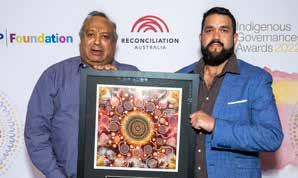
2024 Indigenous Governance Awards
November 2024
Now in its nineteenth year, the Indigenous Governance Awards honour the outstanding Aboriginal and Torres Strait Islander-led organisations and projects that, through their effective governance models, make contributions to communities and to the nation.
The Awards are an initiative of Reconciliation Australia’s Indigenous Governance Program, which champions First Nations governance as a key part of our reconciliation journey and provides resources for emerging leaders. The Awards are held every two years with three categories.
‘Winning had a far bigger impact than we had ever imagined,’ said Brewarrina Local Aboriginal Land Council CEO John Reidy, winners of 2022 category two.
reconciliation.org.au/ our-work/indigenousgovernance

Winners of the 2022 category two awards, Brewarrina Local Aboriginal Land Council, said it ‘changed everything’.
Photo: Joseph Mayers
5 Issue no. 51 / May 2024
RECONCILIATION RECAP

24 November 2023

Narragunnawali forum
In November 2023, Reconciliation Australia’s Narragunnawali: Reconciliation in Education program and the University of Melbourne’s Ngarrngga Project co-hosted the Reconciliation and Education: Past-Present-Future Forum.
The forum brought together educators from all over the country, encouraging them to look back at the inspiring work of First Nations leaders in education. Together, they explored how their legacies continue to shape and motivate our current and future efforts in reconciliation and education.
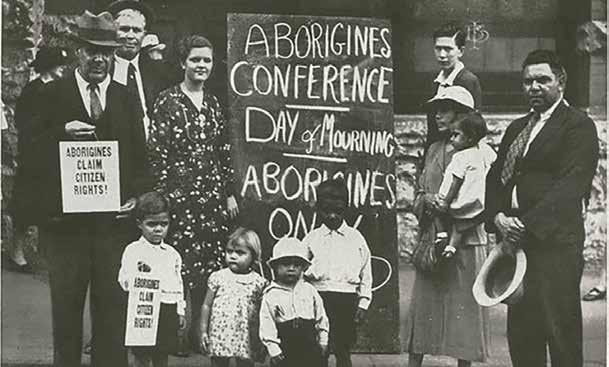
Survival Day
26 January 2024
We saw what a more united and reconciled nation might look like on 26 January as a growing number of Australians chose to attend Survival Day marches, concerts, and festivals.
These events echo resistance going back to 26 January 1938, when the Victorian Australian Aborigines League and the Aborigines Progressive Association held the first Day of Mourning to mark the harm of colonisation with a demonstration in Sydney (pictured). As the organisers said then, ‘The 26th of January, 1938, is not a day of rejoicing for Australia’s Aborigines; it is a day of mourning.’
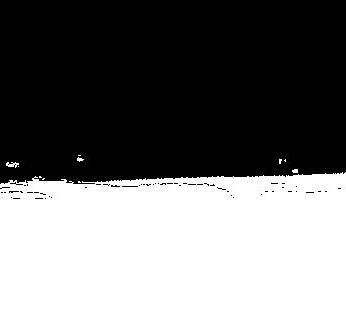

The day's discussions left attendees with one final question: Remembering that every present is a former future, what future are you honouring today?
The teams are now working on a report highlighting insights and recommendations from the day.
Learn more at narragunnawali.org.au/about/news/
Leaders in education contributing to the ‘Past’ panel discussion and the Reconciliation and Education forum. L to R: Aunty Geraldine Atkinson, Professor Leanne Holt, Associate Professor Joe Sambono, Aunty Professor Tracey Bunda and Professor Melitta Hogarth. Photo: Tom Hoy, Wirrim Media
Some 86 years later, workplaces have started to adapt to changing attitudes and behaviours to the public holiday, with employers offering staff the option to choose an alternative day off.
What is evident from these initiatives, as well as the growing number of local councils that no longer hold citizenship ceremonies on 26 January, is that Australians are beginning to deepen their knowledge of our shared history and appreciate the need for a date everyone can celebrate.
Woolworths’ decision to no longer offer Australia Day merchandise sparked controversy but – like with many of the other retail giants who’ve made this choice – this decision was based on steeply declining sales in recent years.
This increasing reassessment of 26 January as a day for national celebration is a cause for optimism and a sign of growing maturity in Australia’s attitudes to justice and recognition of First Nations peoples.
Read Reconciliation Australia’s full statement at reconciliation.org.au/26-january-2024
first Day of Mourning in 1938. L to R:
The
William Ferguson, Jack Kinchela, Isaac Ingram, Doris Williams, Esther Ingram, Arthur Williams, Phillip Ingram, Louisa Agnes Ingram OAM holding daughter Olive Ingram, and Jack Patten. Photo: Creative Commons, Mitchell Library, State Library of New South Wales
6 Issue no. 51 / May 2024

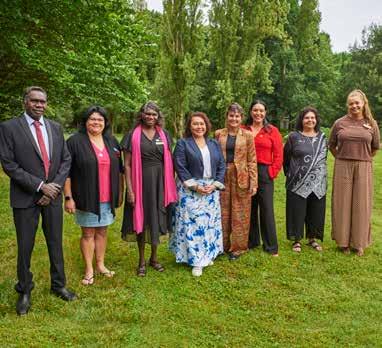
Australian of the Year Awards Breakfast
25 January 2024
Reconciliation Australia hosted its annual Australian of the Year Award Breakfast on Ngunnawal/Ngambri Country, honouring and celebrating the Aboriginal and Torres Strait Islander finalists and non-Indigenous finalists who work closely with First Nations communities.
Accompanied by family and friends, the finalists were: ACT Local Hero Selina Walker; NT Local Hero Witiyana Marika; NT Senior Australian of the Year Yalmay Yunupiŋu; WA Australian of the Year Mechelle Turvey; SA Young Australian of the Year Tiahni Adamson; TAS Young Australian of the Year Naarah; VIC Australian of the Year Janine Mohamed.
Teacher, community leader and linguist Yalmay Yunupiŋu took home the Senior Australian of the Year award later that evening.
The Yolŋu woman has dedicated her life to develop bilingual education in her community and retired after four decades at the Yirrkala Bilingual School in 2023.
Go to australianoftheyear.org.au/ recipients to learn more about the finalists.
Decades of First Nations success on display at the 2024 Australian of the Year Awards breakfast. L to R: Witiyana Marika, Selina Walker, Yalmay Yunupiŋu, Karen Mundine, Tiahni Adamson, Janine Mohamed, Mechelle Turvey, Naarah. Photo: Salty Dingo
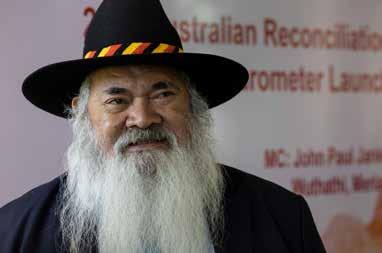
Patrick Dodson’s retirement 26 January 2024
Reconciliation Australia paid tribute to Patrick Dodson and his decades of hard work and commitment to the reconciliation movement. A Yawuru man from Broome, Patrick Dodson’s informal title, the Father of Reconciliation, is well deserved after his successful leadership of the movement over many decades.
He first came into the national spotlight as a Commissioner with the Royal Commission into Aboriginal Deaths in Custody which recommended the urgent need for a formal process of reconciliation between the wider Australian community and Aboriginal and Torres Strait Islander peoples.
He went on to become the inaugural Chairperson of the Council for Aboriginal Reconciliation. More recently, as a Senator for Western Australia, he was appointed the Special Envoy for Reconciliation and Implementation of the Uluru Statement from the Heart in the Albanese Government.
We wish Patrick the very best and thank him for his outstanding contribution.
To learn more about Patrick Dodson’s life and legacy watch Living Black: Patrick Dodson - Father of Reconciliation on SBS OnDemand: sbs.com.au/ondemand/news-series/ living-black
Patrick Dodson at the 2022 Australian Reconciliation Barometer launch at Parliament House. Photo: Andrew Taylor
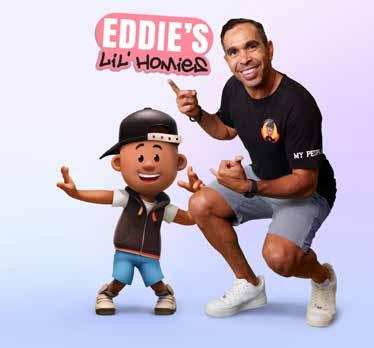
Eddie’s Lil’ Homies 16 February 2024
Eddie Betts’s new ten-part children’s comedy series Eddie’s Lil’ Homies is streaming now!


The sporting legend has partnered with the Australian Children’s Television Foundation, Netflix and NITV to bring his series of children’s books to the small screen. The show follows imaginative 8-year-old boy Eddie and his best friends Lottie and Tal, who have fabulous, fantastical playground adventures full of music and games.
The animated show is inspired by Eddie’s popular series of books for early readers, My Kind and My People
The books were written as an educational resource, with My Kind focusing on spreading kindness and understanding, acceptance and equality, and My People designed to start conversations about Aboriginal and Torres Strait Islander peoples’ cultures and to combat racism and bias.
Eddie’s Lil’ Homies – made by First Nations producers, writers and actors – is a show that can be enjoyed by everyone. Don’t let the kids have all the fun!
Learn more about Eddie’s work at eddieslilhomies.com
Eddie’s Lil’ Homies is streaming now on Netflix and SBS OnDemand. Photo: Eddie’s Lil’ Homies
7 Issue no. 51 / May 2024
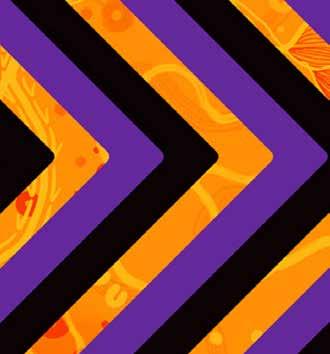
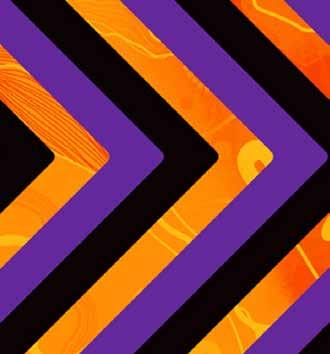
NOW MORE THAN EVER: NATIONAL RECONCILIATION WEEK
The National Reconciliation Week 2024 theme, Now More Than Ever, is a reminder to all of us that no matter what, the fight for justice and the rights of Aboriginal and Torres Strait Islander people will – and must – continue.
National Reconciliation Week (NRW) – 27 May to 3 June – is a time for all Australians to consider the personal contribution they can make to creating a better, more reconciled country.
There have been many moments in Australia’s reconciliation journey that make us want to turn away. But when things are divisive, the worst thing we can do is disengage or disconnect.
The NRW 2024 theme, Now More Than Ever, urges our supporters to tackle the unfinished business of reconciliation. This NRW and beyond, we need to stand up to defend and uphold the rights of First Nations peoples. To call out racism wherever we encounter it, and to actively reinforce the voices of Aboriginal and Torres Strait Islander peoples across this continent.
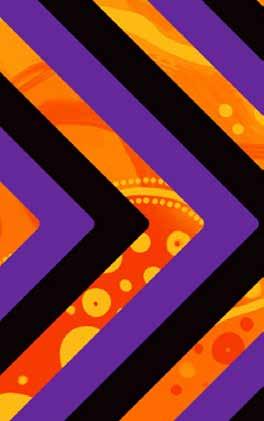
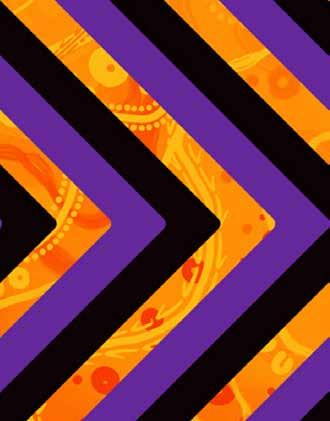
Now more than ever, the work continues. In treaty making, in truth-telling, in understanding our history, in education, and in tackling racism. We need connection. We need respect. We need action. And we need change. Now more than ever, we need reconciliation.
The NRW 2024 design and artwork represent the momentum of the theme, with the chevron, a universal symbol for pointing the way, signifying advancing as one; and the vibrant artwork of Gubbi Gubbi artist Maggie Douglas encouraging connecting with one another.
Read more: It’s time to stand up for reconciliation on page 20.

Calling all crooners! Reconciliation Australia is inviting singers across the country to come together in song for National Reconciliation Week.
The song we will sing is the great reconciliation anthem Blackfella/Whitefella by the Warumpi Band. Register your choir or group to access arrangements and backing tracks: bit.ly/voicesforreconciliation
8 Issue no. 51 / May 2024
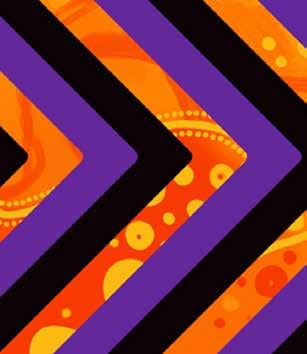
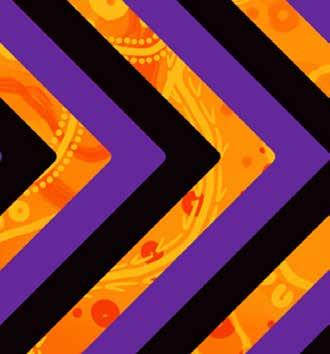
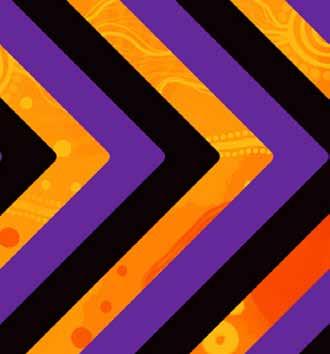
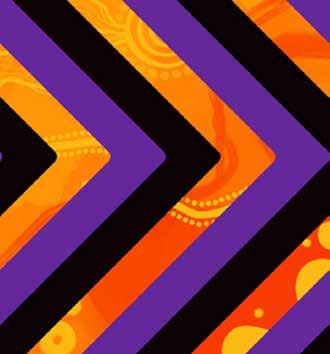
WHAT EVENT SHOULD WE ORGANISE FOR NATIONAL RECONCILIATION WEEK?
Reconciliation is everyone’s business and NRW is celebrated in all walks of Australian life. Schools and universities, workplaces and community groups, sports codes and religious institutions and so many more, all take part in NRW – and hopefully you do, too!
We have some tips to inspire your NRW event and to make sure, whether its big or small, it’s contributing to creating a more reconciled Australia.
Aim for meaningful
There is no one way to commemorate NRW, but it is important to take the time to think sincerely about the context of your event or gathering.
The most meaningful NRW events are ones that grow your knowledge and understanding; prioritise Aboriginal and Torres Strait Islander voices; and are tailored to your situation.
For example: a bookshop might organise a talk with a First Nations author; a local sports team could hold an Indigenous Round game; and a friendship group of musos might attend the gig of an Aboriginal and Torres Strait Islander artist. Whatever starts a conversation is the way to go!
Share the load
It’s crucial to be aware of the load that is carried by First Nations people over NRW. Aboriginal and Torres Strait Islander people are often asked to organise, attend and speak at events and share their personal experiences again and again. This can be incredibly draining.
There are ways to make sure your event is helping not hindering. Don’t assume that an Aboriginal and/or Torres Strait Islander person wants to be involved in NRW – ask respectfully first. Make sure the organising is not falling on First Nations friends and colleagues. Ensure Aboriginal and Torres Strait Islander people are supported to carry out their responsibilities to their communities. Discuss the availability of remuneration for First Nations speakers and experts upfront.
Ideas to get you started
Check out the NRW events portal. Hundreds of public events are held for NRW every year – go to the portal to find in-person events in your state or territory, and online events across the country that you can attend: reconciliation.org.au/calendar
Host a Reconciliation Film Club screening. Show a compelling documentary by a First Nations filmmaker to start a discussion on a range of issues, including history, justice and equality. Reconciliation Film Club is a unique and thought-provoking way to bring people together for NRW and the website hosts downloadable screening kits, discussion guides and features articles and ideas to support a successful event: sbs.com.au/nitv/reconciliationfilmclub
Go local. Do the First Nations organisations in your area host events or welcome the public to attend open days and other initiatives? Find out and connect with local Traditional Owners. Cultural tours of your town or city are also a great way to learn more about the Country you’re on and its rich history.
Get cultural. Across Australia, many exhibitions and shows feature or are by Aboriginal and Torres Strait Islander artists, musicians and creatives. Organise a daytrip for your office or a night out for your friends and support the vibrant community of First Nations artists.
Start reading. It’s not stranger than fiction – hosting a reconciliation book club makes for a great NRW event! Aboriginal and Torres Strait Islander authors telling their stories their way is a sure way to broaden perspectives and understanding. Search for ‘look for a book’ on reconciliation.org.au for recommendations.
Still unsure? If you are still stuck, questions to ask yourself are: Whose Country am I on? What’s the shared history of this place, from before and after colonisation? What is my industry’s/ community’s relationship to Aboriginal and Torres Strait Islander peoples? How does this year’s NRW theme relate to me and the event I am trying to run? The answers to any of these questions would make a strong basis for a meaningful NRW event.
9 Issue no. 51 / May 2024
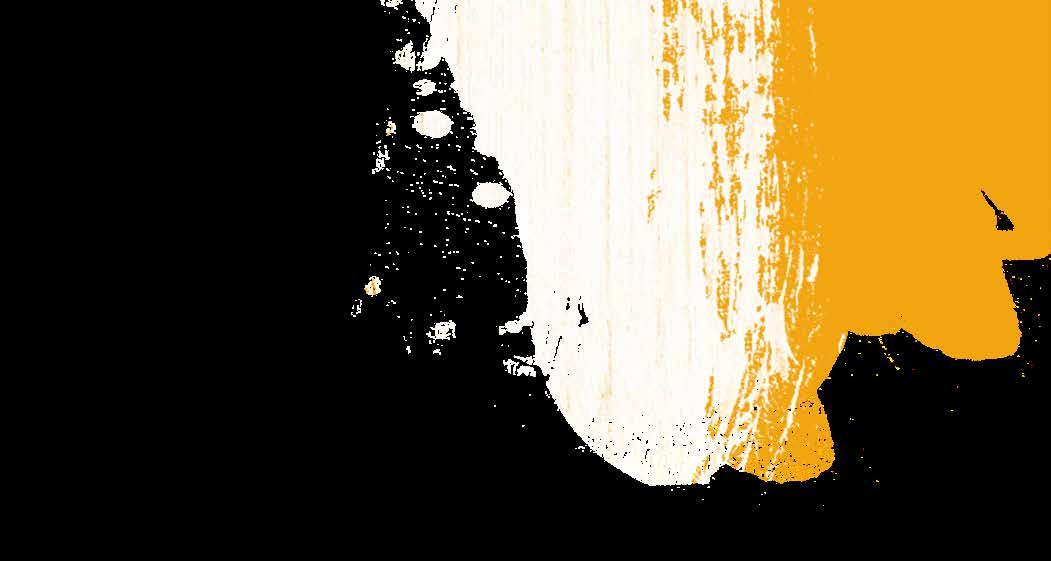
‘SOMEONE ELSE LIKE ME’: ATHLETE AND COACH JACARA EGAN IS DECOLONISING SPACE FOR ABORIGINAL WOMEN IN SPORT
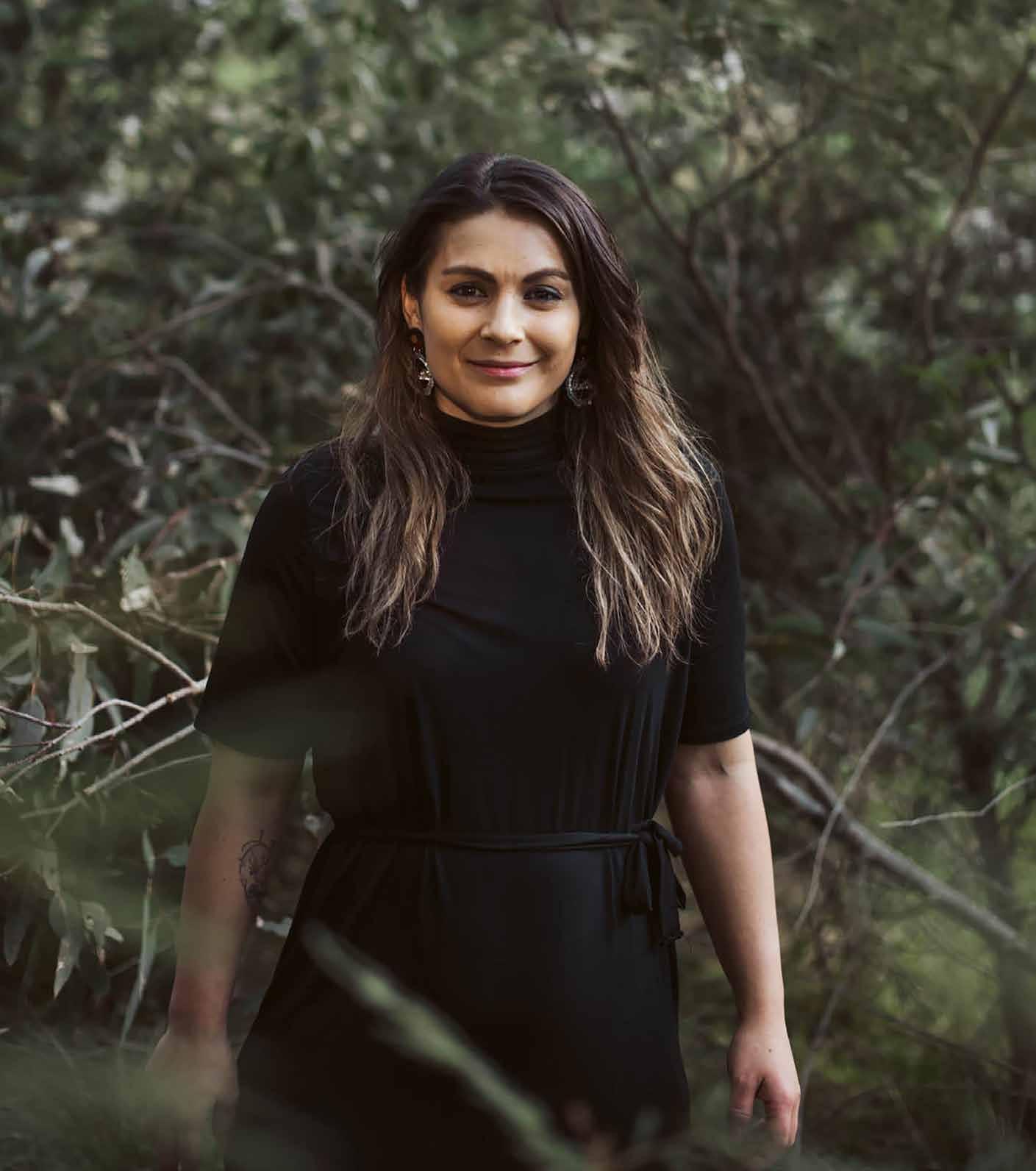
Jacara Egan remembers clearly what it felt like to be the only Aboriginal woman in her team. Now, she’s working to build culturally safe spaces to keep the next generation of Aboriginal and Torres Strait Islander women and young women in sports.
 Jacara Egan is a Change Our Game Ambassador, advocating for more First Nations women across all levels of sports. Photo: Phoebe Powell
Jacara Egan is a Change Our Game Ambassador, advocating for more First Nations women across all levels of sports. Photo: Phoebe Powell
10 Issue no. 51 / May 2024
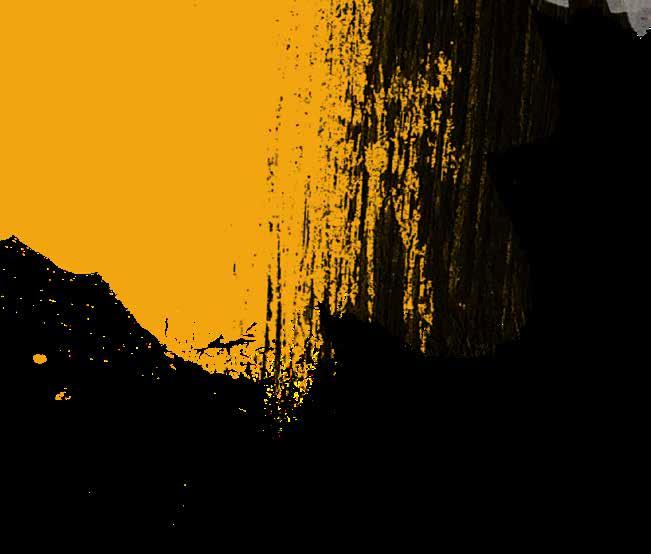
U19 National Championship.
It was around this time that Egan recalls a distinct moment when she became especially aware of her status as ‘the only Aboriginal woman’ on her sports team.
‘While I was supported quite well by my family and community, there were often spaces where I was like “I’m the only one here”,’ Egan says, adding that along with this realisation comes the fear of exhaustion and the need to fit in, while asking yourself where is best to seek support.
‘It wasn’t until another Aboriginal woman joined our team when I was playing for South Australia that I kind of let the mask go and took that breath in and went “Oh now this is deadly having someone else like me here”,’ she says.
After that, Egan’s family and her fellow Aboriginal teammate’s family would often connect and support each other with rides to tournaments or practices.
There was a sense of community and support that emerged, similar to what Egan had experienced growing up in a rural area, on the banks of the Dunghala River in Mildura.
‘Sport was one of the biggest things in that society,’ she says, adding that she was able to try so many different types of sport, including volleyball, cricket and softball – her great love.
‘There’s just so much benefit from having young women and women across all levels of your club or levels of sport.’
But even if Egan hadn’t landed on her passion for softball as a kid, she’s positive that she’d still attribute involvement in sport as a way to nurture confidence and a mastery of her own self and her own body as a young woman.
Following her softball career, Egan continued to grace the sporting community through various leadership roles, advocating for First Nations rights and wellbeing along the way.
Currently, Egan coaches women at the AFL and VFLW level. She’s also a mental health social worker, working as National Manager of First Nations Healing and Wellbeing with Headspace.
‘I’ve got a deeply ingrained stubbornness,’ she jokes. ‘If I love something and want to do something, I’m aware of the barriers that may be there but I’ll do everything in my power to [get around that].’
‘To be honest, I wasn’t aware as a young person that as a young woman, my options were limited.’
Reflecting back as an adult, however, Egan can see the structural barriers that are present for women in sport and notes that there were many women who did ‘an amazing amount of work’ so that she could participate in sport at the level that she has done.
‘A lot of our young women drop out of sport at about 14 years old now –it’s something which is really sad, Egan says, considering. ‘We know the benefits of sport in leadership and skill development.’
Determined to shift the dial, Egan is working to create culturally safe environments to increase First Nations women’s participation in sport as athletes and coaches. She also wants non-Indigenous people to gain access and grow from First Nations knowledge and ways of being.
Egan has been selected by the Office for Women in Sport and Recreation as a Change Our Game Ambassador to use the advocacy platform for this critical step forwards. She stands alongside seven other inspiring women in the Change Our Game movement who are raising awareness on key issues in women’s sport.
‘It’s about Aboriginal women and young women having that equal opportunity and space to safely come in, stay in and add opportunity in sport – not just on the field but really looking at more broadly decolonising some of these spaces,’ says Egan.
‘There’s just so much benefit from having young women and women across all levels of your club or levels of sport.’
Change Our Game Ambassadors are using their platforms to help drive change and raise awareness on key issues and barriers for women in sport. Learn more through @ChangeOurGame on socials or at changeourgame.vic.gov.au
This article was written by Brianna Boecker for Women’s Agenda. Read more: womensagenda.com.au
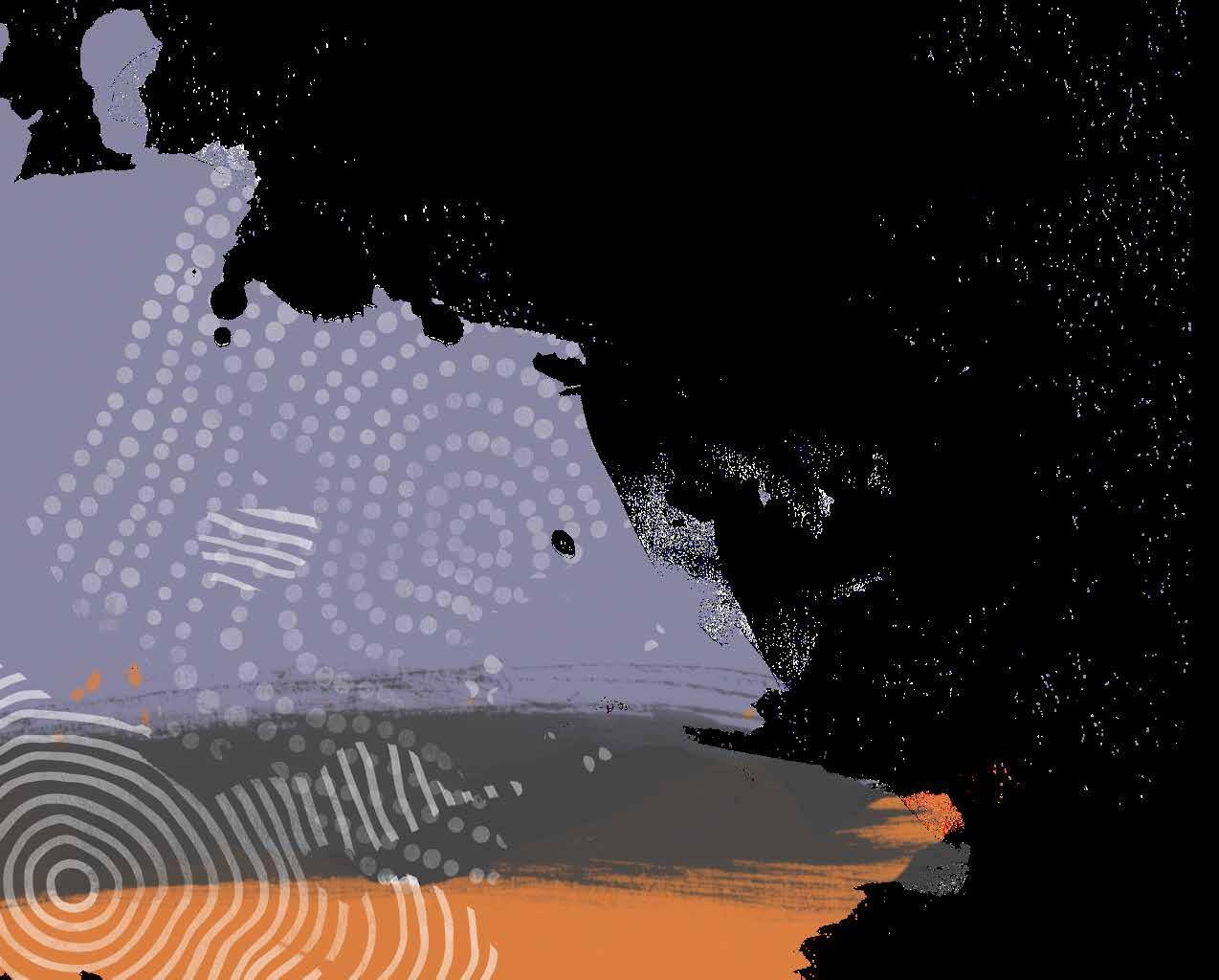
11 Issue no. 51 / May 2024
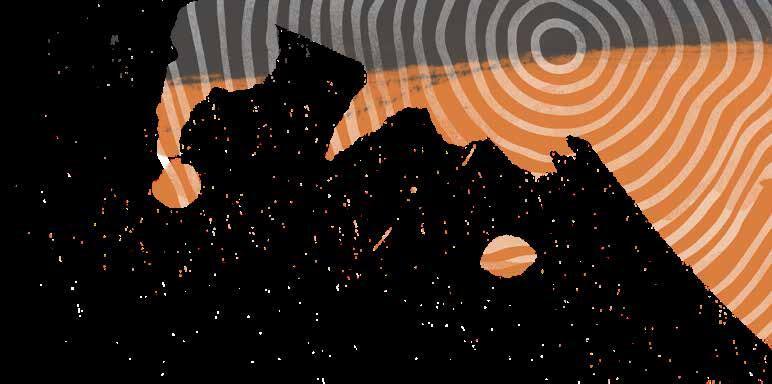
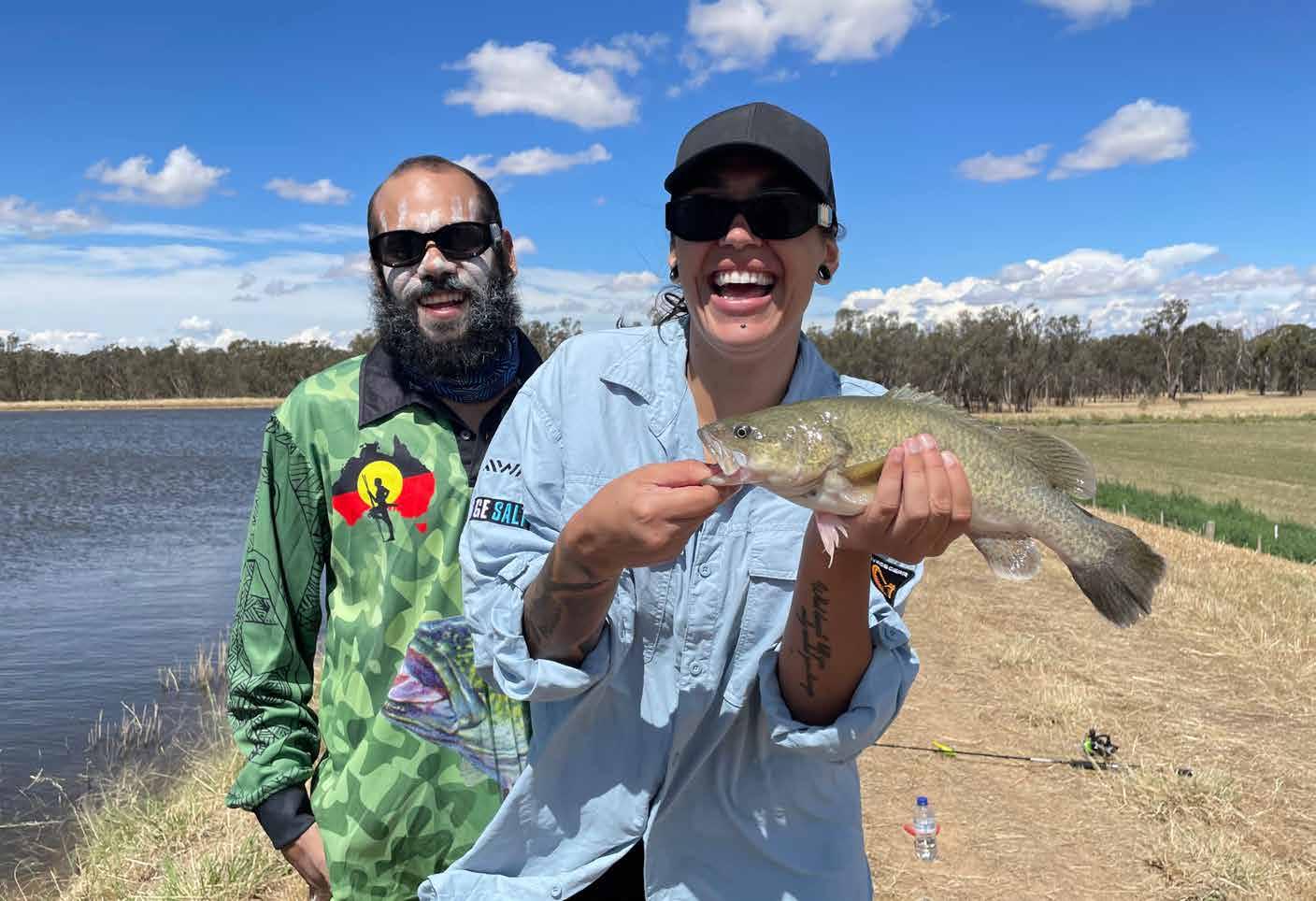

HOOKED ON RECONCILIATION: FISHING AND SAVING THE BURNANGA ON THE DUNGALA
One in five Australians fish for fun. What if recreational fishing could bring our country closer together, while also conserving our rivers and waterways? Freddy Morrison is putting this question to the test, one fish at a time.
Stricken with disappointment after the failure of the Voice referendum, Yorta Yorta/Waddi/Wemba and Burapa man Steve ‘Freddy’ Morrison decided that his love for fishing the iconic burnanga (Murray cod) might be his way of helping the country to reconcile.
‘I’ve been pushing for reconciliation for years,’ he told Reconciliation News. ‘We weren’t moving forward enough so after the referendum I decided that the way I could help was through fishing.’
He points out that a recent Australian Bureau of Agricultural and Resource Economics survey found a total of 4.2 million or one in five adult Australians were estimated to participate in recreational fishing each year. Australians spend an estimated 28 million days fishing each year.
Freddy’s love of the dungala (Murray River) and his culture shines through as he speaks. ‘I was born on the river at Echuca and the burnanga is my totem. I just love the river, no matter what part of it.’
A shared love of catching burnanga (Murray cod) on the dungala (Murray River) has the potential to create strong relationships. Photo: Freddy Morrison
Story continues on page 17. 12 Issue no. 51 / May 2024
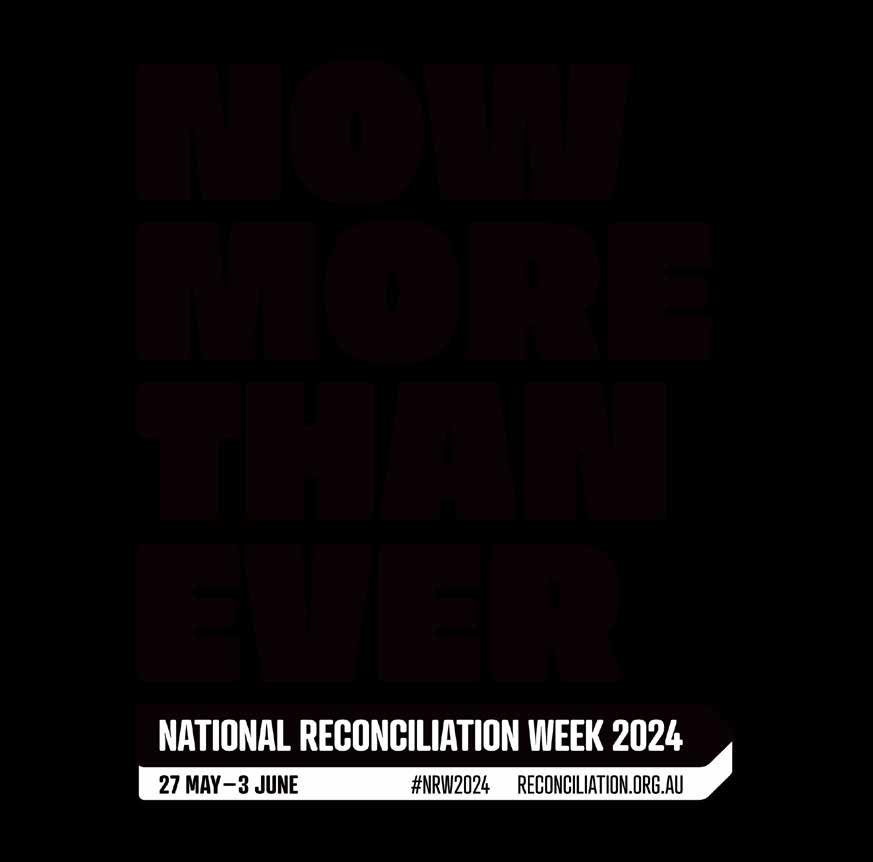
POSTER OVERLEAF
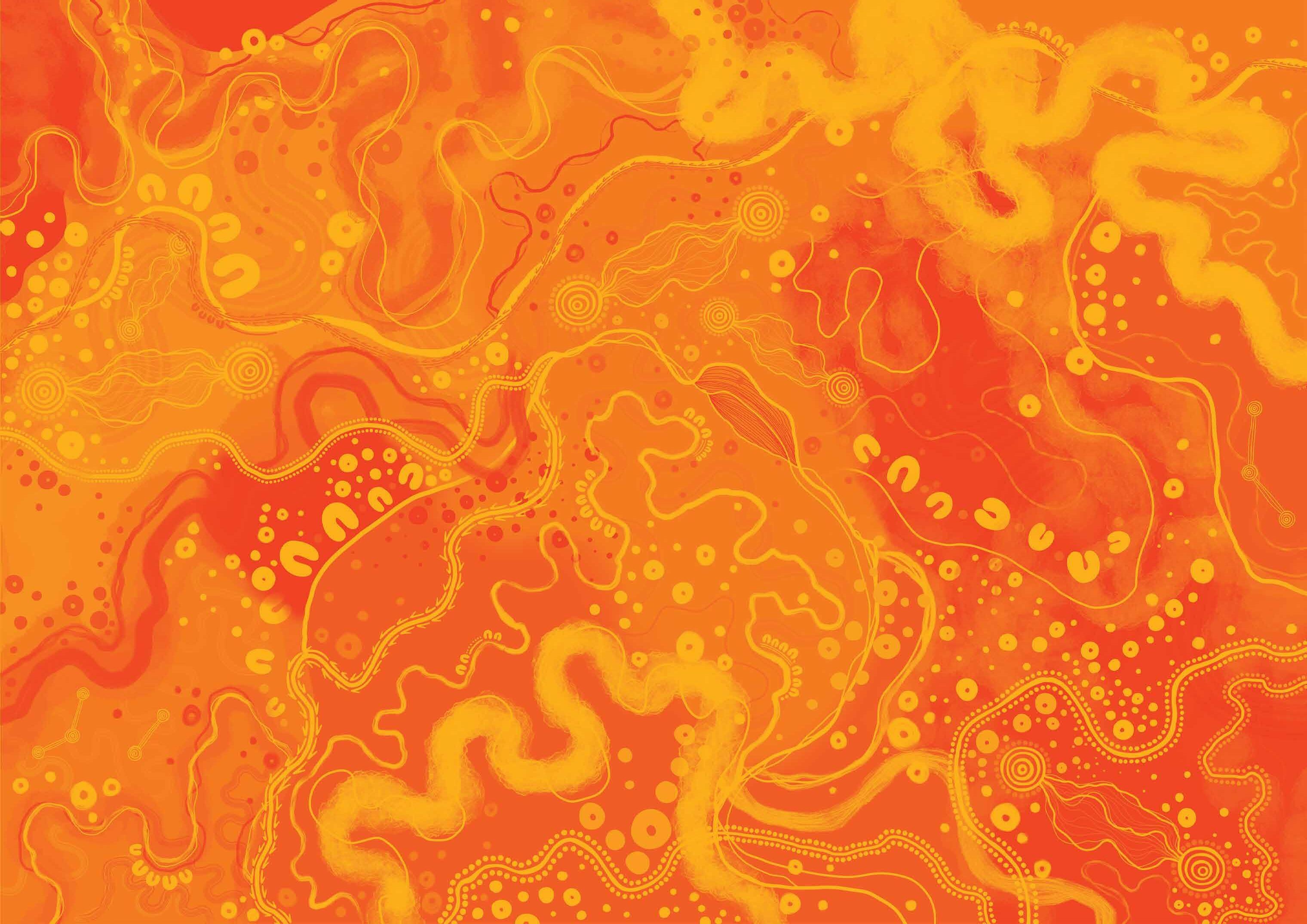


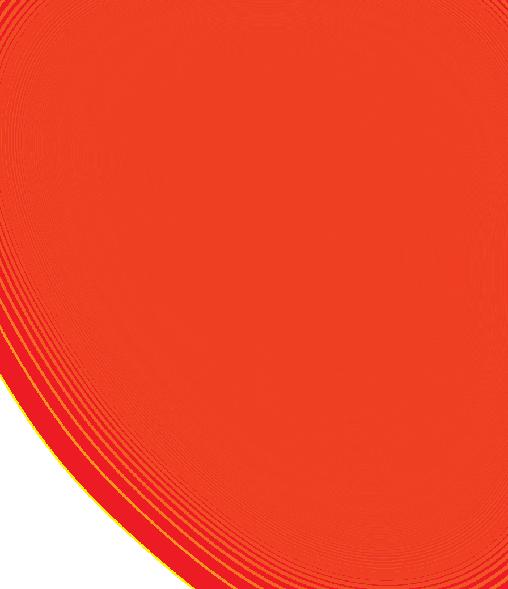





National Reconciliation Week is a time for all Australians to learn about our shared histories, cultures, and achievements, and to explore and reflect on how each of us can contribute to reconciliation in Australia.
To get involved head to reconciliation.org.au/our-work/national-reconciliation-week.
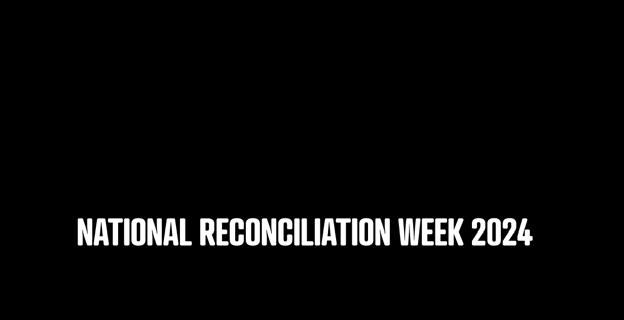
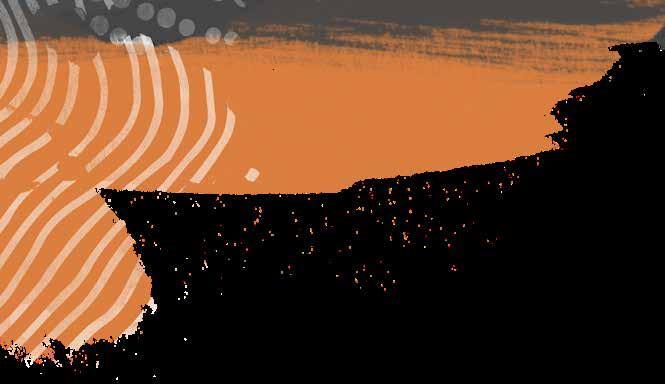
Angling for reconciliation
Now living in the regional Victorian town of Shepparton, Freddy established Victoria’s second Aboriginal Fishing Club, Dungula Maniga Banga, which is Yorta Yorta language for ‘Murray River fishing and hunting’. He uses the club to promote reconciliation with regular public fishing days open to all locals.
The club membership is mainly Aboriginal people, but interest is developing in Shepparton’s nonIndigenous community – one of the most multicultural hubs in regional Australia. The local council reports that 17.4 per cent of the population is born overseas, and 17.6 per cent of the population speaks a language other than English at home.
‘Our club has about five non-Indigenous members so far and I'm currently trying to attract multicultural members in particular,’ said Freddy. ‘We have plenty of Indian and Afghani friends on our Facebook pages and I’m encouraging these folks to come to our next fishing day.
‘It is very important that our Shepparton multicultural community is aware that the cod is in danger; we want to show the community the ways we have looked after cod and Country for generations. How we only take what we need, don’t overfish, and look after the river.’
‘The main aim is to educate the wider community about our culture and share our knowledge,’ explained Freddy.
‘We are slowly getting there after two years. I have had great feedback from the whitefellas; they really enjoyed the fishing days. For some it was the first time they had sat around having a yarn with Aboriginal people.’
Freddy says that Murray cod are significant to First Nations people because not only are they are an excellent eating fish, but the relationship with the fish goes back thousands of years, with many Yorta Yorta stories featuring the treasured cod.
‘The main aim is to educate the wider community about our culture and share our knowledge,’ explained Freddy.
Speaking up for cod conservation
The benefits of Dungula Maniga Banga extend beyond relationships between First Nations and non-Indigenous people. Freddy explains that the growth of Aboriginal fishing clubs – his nephew is starting a new one in Warrnambool – is having an impact on Murray cod conservation. Key stakeholders such as Victorian Fisheries Authority and the Victorian Recreational Fishing Peak Body are starting to listen to Aboriginal people about how best to look after the cod and the river.
‘The Victorian Government is listening to Yorta Yorta and other mobs about managing the cod,’ he said.
However, seeking First Nations peoples' ecological knowledge of fish and riverine systems by Victorian fishing agencies is a welcome but only recent phenomenon.
Leading Yorta Yorta academic and educationalist, Dr Lois Peeler AM, gave Melbourne University’s 2020 Dungala Kaiela Oration, The River is Us: Carrying the Spirit and Strength of the Dungala
‘Aboriginal knowledge and narrative have mainstream importance for survival, emotional health and the general wellbeing of all humanity,’ Dr Peeler told her audience.
‘Mainstream Australia hasn’t availed itself of the library of information on seasons, preservation, flora and fauna – Caring for Country on land and waters that the world’s longest living culture embodies.’
Thousands of generations of fishers
One body that is excited about using the Aboriginal knowledge of the Murray cod is the Victorian Recreational Fish peak body (VRFish) whose executive officer Ben Scullin attended a recent fishing day organised by Dungula Maniga Banga.
‘We know that on average there is three times the participation in recreational fishing in First Nations communities than in other Victorian communities, so when Freddy first contacted us to say, “I want to form a club”, I told him that we would give him any help he needed.
‘He asked why are we not advancing reconciliation through something that we all love doing?’ Ben told Reconciliation News. ‘I thought, this is an amazing idea.’
VRFish now has a statement of purpose written into its constitution to ‘recognise the heritage, culture and contribution of our nation’s First People, and to give practical support to the issue of Indigenous reconciliation through recreational fishing’.
‘Spending time on Country with Freddy just blows me away, the added value that his traditional knowledge brings to me as a recreational fisher who cares for the environment is enormous,’ said Ben.
‘I am an expert in fishing the cod with lures – I won the Mulwala Cod National a few years ago – but I was standing on the river with Freddy as he explained how his people used the silver wattle to catch Murray cod.
‘I was blown away by that and by how he sees, and knows the river, compared to me; about how much I don’t know. His skills finding cod are remarkable … He has the knowledge of more than a thousand generations of catching cod.’
‘Even Freddy’s six-year-old son, Isiah, was telling me things I didn’t know!’
Ben argues that greater input from First Nations people into water and fish management will be a critical component of improving the health of rivers and lakes.

‘In terms of management expertise, there’s not many better is there?’
For Freddy it's all about saving his beloved Dungala and burnanga, while ‘sitting down together and having a laugh, that’s the way we move forward, that’s the way we can heal.’
17 Issue no. 51 / May 2024
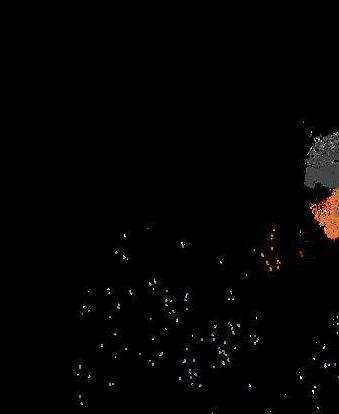


KAYA AND CIAO FROM WINTERFOLD SCHOOL
The cross-cultural learning and excellence of Winterfold School in Fremantle, Western Australia has been celebrated for how its engagement and teaching of Noongar language has led to a unique relationship with its local Italian community.
Western Australia has a well-documented record of violence against First Nations peoples, but many West Australians are finding genuine and thoughtful ways to overcome this legacy by ensuring Aboriginal and Torres Strait Islander cultures are an indivisible part of its diverse community.
A small school near Fremantle has been recognised for its commitment to anti-racism, teaching Noongar language and culture and building links between the local Italian and Noongar communities it serves.
Winterfold Primary School won the schools category in the 2023 Narragunnawali Awards. The award recognises and celebrates Australian schools and early learning services that are implementing outstanding reconciliation initiatives.
Chair of the awards judging panel and Reconciliation Australia Board Director, Shaz Davis, said the school inspired the judges with its strong connections to its local Noongar community and a vigilant policy of anti-racism.
‘Winterfold’s Principal told the judges that reconciliation and antiracism was at the core of the school’s culture and curriculum, and this was obvious to us all when we visited the school,’ they said.
‘The use of Noongar language and the school’s clearly warm and supportive relationship with Noongar Elders, parents and kids was wonderful to witness.’
Noongar/Italian student Reuben Hayden-Nelson Junior with his father Reuben Senior. Photo: Winterfold School
18 Issue no. 51 / May 2024
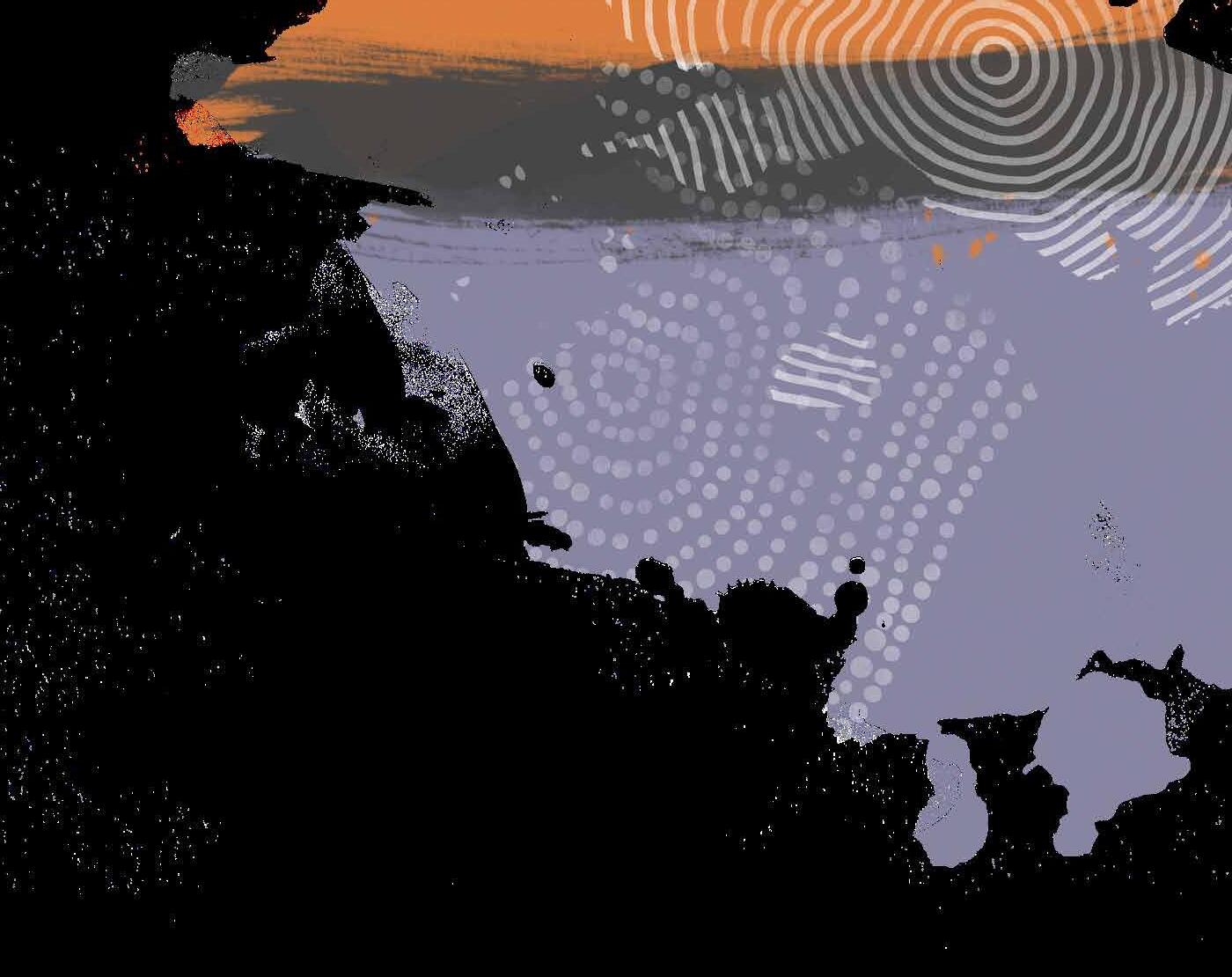
Pride in culture
Winterfold’s reconciliation journey really began in earnest in 2019 when a Reconciliation Committee composed of teachers, education assistants and Aboriginal and Torres Strait Islander parents developed its first Reconciliation Action Plan (RAP) using Reconciliation Australia’s Narragunnawali platform.
The RAP centred on the cross-curriculum teaching of Aboriginal and Torres Strait Islander histories and cultures.
School Principal, Kim Calabrese, said a commitment to truth-telling and open and honest conversations about injustices, which have occurred since colonisation, is pivotal to the school’s vision.
‘One of the first steps of the school’s reconciliation journey was to learn more about the Aboriginal Country on which the school stands, Beeliar Wadjak (Whadjuk) Noongar boodja (country) and its history,’ she told Reconciliation News.
‘Noongar language has become a prominent part of the learning environment, with signage across the school and sharing Noongar words in the parent newsletter, assemblies and in classrooms to support teaching and learning programs.
‘Students tell us that their families also want to learn the Noongar language and students are going home teaching their parents new words each fortnight.’
Kim Calabrese reports that First Nations student attendance at Winterfold outperforms other schools and student feedback from annual surveys reflects a sense of belonging and inclusion.
‘Our students are proud of their cultures, and this is evident in their willingness to share knowledge with other peers and teachers.’
Italian and Noongar – an affinity through language
Noongar is not the only language centred at Winterfold. Italian is taught as part of the Western Australian Curriculum.
With high numbers of Italian immigrants arriving in Perth and Fremantle from post-war Europe in the 1950s, Italian culture is also of great significance to the heritage of the area. Noongar language is shared with the school community alongside the teaching of Italian in the classroom.
Kathleen Turtur, a woman of Noongar and Italian heritage and parent of former student, Rueben HaydenNelson, said the mix of Italian and Noongar languages has worked to build better understandings between the two communities.
‘Noongar and Italian cultures are similar in many ways,’ she explains. ‘They are both extremely family-orientated and in both Noongar and Italian families, Elders are deeply respected
‘When my Nonna came to Australia from Sicily, she was told not to speak her own language and that she should adapt to the Australian culture in order to be accepted. I wish she had been able to hold onto her true identity and pass on her language to us.
‘The same was true for the Noongar side of my family. They were punished for speaking their traditional language. I didn’t have the opportunity to learn either of my heritage languages when I was at school, so I’m really glad my son was able to learn both at Winterfold.’
She agrees with Kim Calabrese that the school’s focus on Noongar language and culture has improved outcomes for First Nations and other children.
‘Now that culture and language are celebrated, there is pride in our kids. Culture is a big part of our identity and when our kids are free to express this they go in amazing directions.
‘Our kids are strong in their culture and this helps them daily.
‘Reuben was a quiet kid but when he was introduced to culture, dance and language he came out of his shell; his confidence grew so much he was able to stand up in front of the whole school and do an Acknowledgement of Country. We never thought he could do something like that,’ said Kathleen. ‘And now he’s even started teaching me new words in Noongar!’
According to Principal Calabrese the Winterfold community embodies a sense of family. ‘Everyone looks out for each other and genuinely cares about the success of all students which makes our school a truly exceptional and welcoming community to be a part of.’
And it seems the Winterfold family’s vision is making a tangible difference to its Aboriginal students.
‘Before Noongar culture and language was elevated to Winterfold there were kids getting into trouble and heading down the wrong road, said Kathleen Turtur. ‘But ever since the culture has been celebrated in the school, the kids are really feeling a part of the school because they are surrounded by culture. You’ll see kids really elevated and hold pride in what they do when their culture is respected, they feel safe.’

19 Issue no. 51 / May 2024
NOW MORE THAN EVER: IT’S TIME TO STAND UP FOR RECONCILIATION
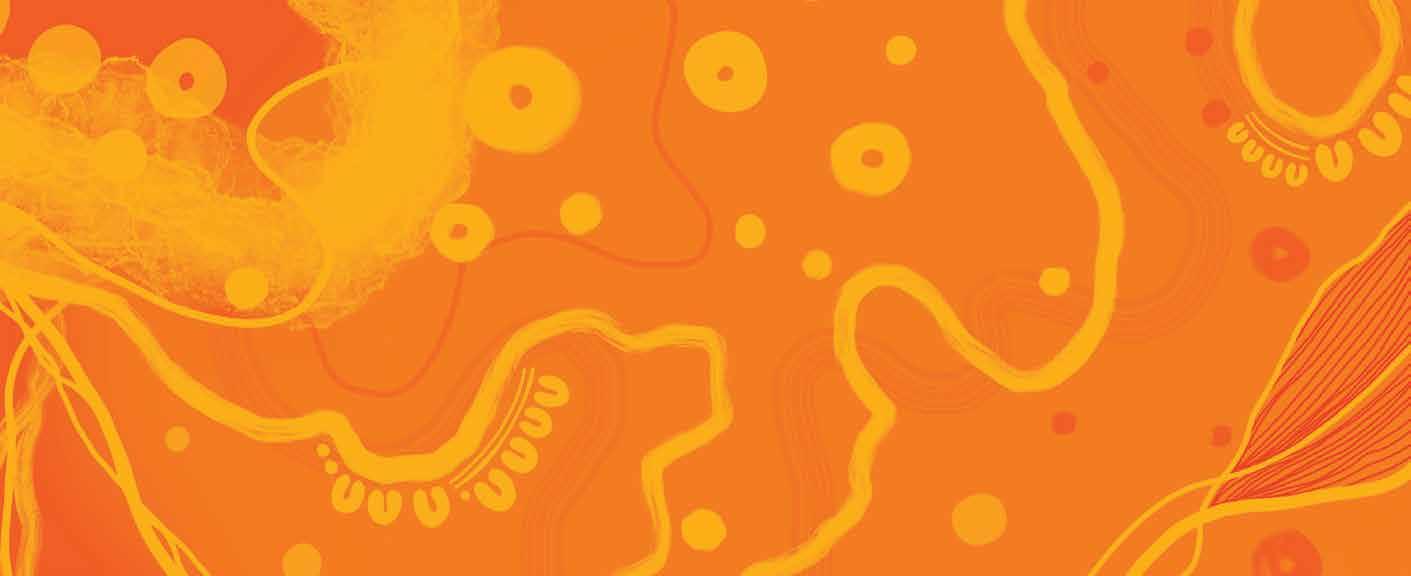
Bundjalung woman and Reconciliation Australia CEO Karen Mundine addresses this year’s National Reconciliation Week theme –Now More Than Ever – and concludes that in the post-referendum world we can no longer accept more of the same.
We are in an historic phase on Australia’s journey towards reconciliation.
In October last year we dealt with the profoundly disappointing outcome of the referendum on a Voice to Parliament – an appeal to the Australian public to elevate and protect a national First Nations body within the Australian Constitution.
Instead of creating an opportunity to reset our relationships through diverse ways of engaging, opponents of the rights of Aboriginal and Torres Strait Islander people are attempting – and will continue to attempt – to seize this result to push their retrogressive and racist agendas.
In the weeks and months postreferendum, there was a flurry of media attention on an imaginary wave of local councils abandoning Welcomes and Acknowledgements of Country.
Like many things in life, the truth is much less dramatic. At the time of writing there have been three local councils – out of the 500-plus LGAs – that have done so.
There have been other councils that debated these propositions but all of them have so far kept these important ceremonies.
In the lead up to 26 January, Woolworths was accused of trying to ‘cancel Australia Day’ by acting on their commercial decision not to stock specific Australia Day products in store, a decision made because of steeply declining sales. Kmart and Aldi also revealed they would not be stocking these products. All simply made business decisions based on changing consumer behaviours that are no doubt reflective of how Australians are reconsidering what 26 January means to different parts of the community. But if we were to believe the headlines, 26 January was cancelled.
Most recently we have seen brazen public acts of racism, no doubt emboldened by the tenor of the referendum debate and defeat. And while shocking and outrageous to some, for many if not all Aboriginal and Torres Strait Islander people, these acts are neither surprising nor unexpected.
Seize the moment to build a better nation
Having taken time out – to work through my feelings of disappointment, despair and distress at the referendum result, and to recharge my batteries after the physical exhaustion of the campaign – I now see the clarion call to action to seize the moment.
Now more than ever there is an urgency to the work of reconciliation – to build a better nation that enacts and defends the rights of First Nations peoples to make our own decisions about our own lives and communities.
What the referendum revealed to us is that under the bedrock of mainstream Australian society’s good intentions lies a mantle of ill-informed and misguided conceptions about Aboriginal and Torres Strait Islander people and what is at stake if we do not embrace change.
This mantle has been formed by 230-plus years of harmful policies and rhetoric.

20 Issue no. 51 / May 2024
The fight for Aboriginal and Torres Strait Islander rights, recognition and justice must continue and any advancement must be protected.
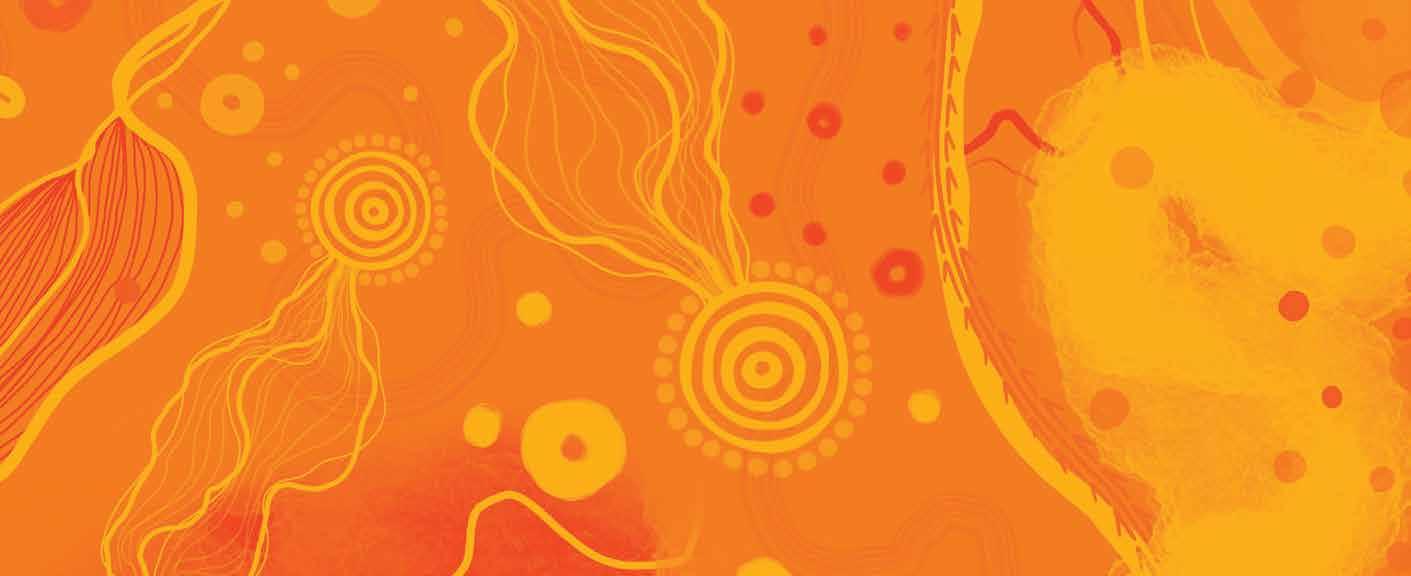
Left unchecked or, worse, purposefully ignited, this mantle can erupt into the kinds of racism and bigotry experienced by First Nations people during the referendum campaign and since.
We only have to look across the Tasman to Aotearoa-New Zealand, to glimpse how this could play out if given oxygen.
The New Zealand Coalition Government, ironically elected on the same day as the Voice referendum, has plans to review the place of the Treaty of Waitangi within New Zealand’s laws; has directed that the Maori language is limited, or removed, from use within the public sector; and shut down the Maori Health Authority, Te Aka Whai Ora – an agency set up to improve health outcomes for Maori people – by the end of June.
Now more than ever, it’s time to take action
Here in Australia, we urged people last year to Be a Voice for Generations to build on the progress we have made towards equality and equity. This National Reconciliation Week, in light of the referendum, we are urging people to take action, Now More Than Ever.
It’s a reminder to all of us that the fight for Aboriginal and Torres Strait Islander rights, recognition and justice must continue and any advancement must be protected.
To not do so is to break with the legacy we have inherited from generations of Aboriginal and Torres Strait Islander activists, advocates and leaders, and the allies who supported them, who fought for every one of the rights we enjoy today.
Now more than ever there is an opportunity to make a difference in this country, to challenge the status quo and not let another generation be lost to systems that were not built for First Nations people nor the diversity of Australia in the 21st century.
Now more than ever it is time to learn from the lessons of the past and accept that without the full engagement of First Nations peoples in the life of this country, Australia is forever diminished.

And now more than ever it will take each of us who can see the benefits and opportunities of making space for Aboriginal and Torres Strait Islander people and our ways of being, knowing and doing, to advocate for and defend those rights against those who would limit or take them away.
Stand up and be counted
As part of National Reconciliation Week, we once again invite choirs, singing groups and schools to raise their voices for reconciliation. It is one of the actions we highlight on our website. This year’s song is the great Australian reconciliation anthem Blackfella/Whitefella by the Warumpi Band.
The song asks: ‘Are you the one who's gonna stand up and be counted?’
This song and our theme are clarion calls to all of you – our supporters, allies, friends and partners – that now is not the time to disengage and disconnect from our mission.
We need you and reconciliation, Now More Than Ever.
This article was first published by Arrilla Indigenous Consulting Pty Ltd, a Supply Nation certified, majority Indigenous owned and operated business working across Australia with over three decades of leadership in cultural competency training and consulting. Published with permission. Visit arrilla.com.au or email info@arrilla.com.au
21 Issue no. 51 / May 2024
wants accountability and reform of racist policing systems and structures.
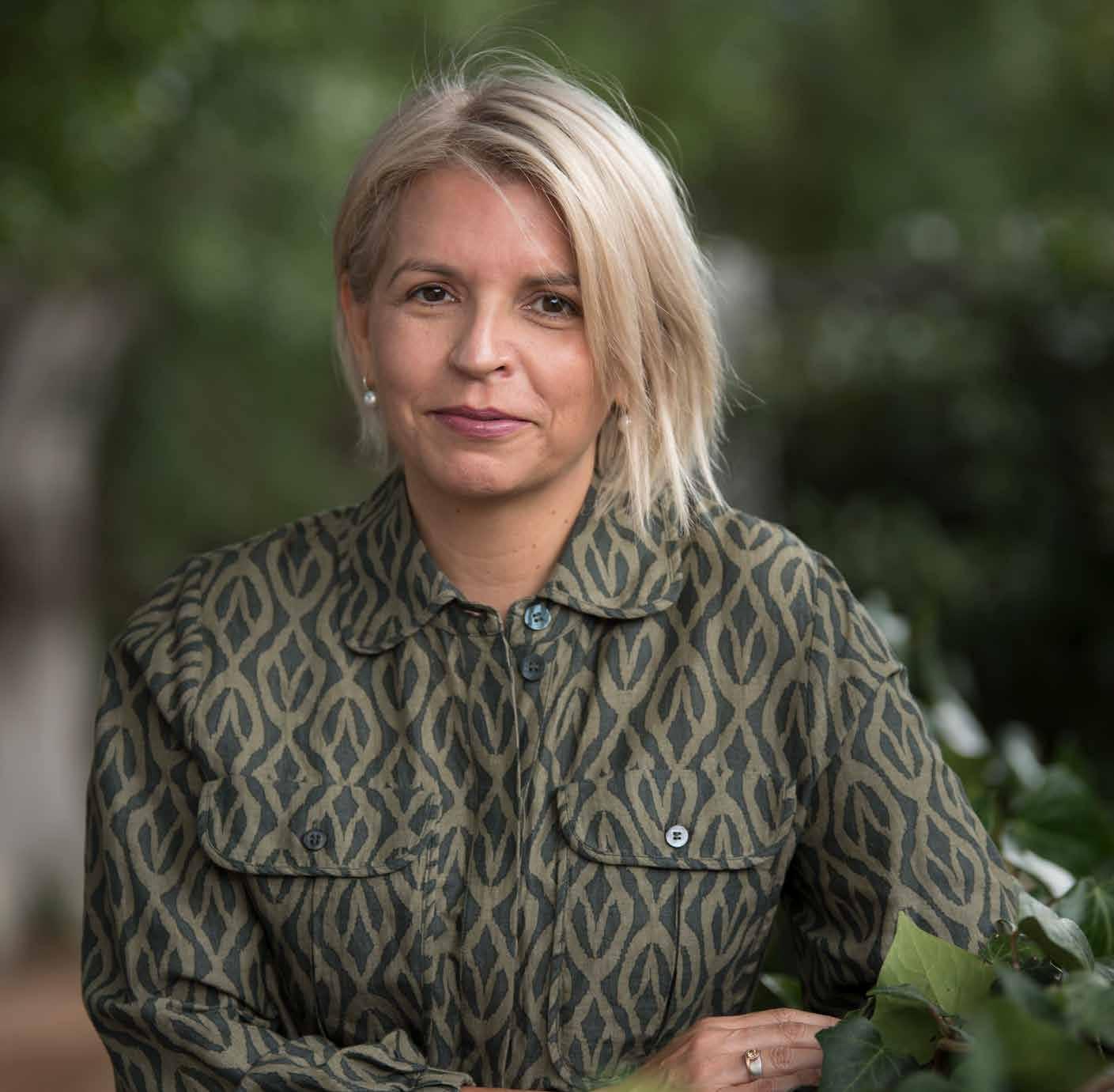
DR HANNAH MCGLADE: INQUESTS EXPOSE RACIST HEART OF POLICING IN AUSTRALIA

Accountability against racism is needed to reform Australian police forces’ relationship with Aboriginal
While racism in policing has long been denied by authorities, we're now witnessing revelations of racist policing across Australia, particularly from coronial inquiries into the deaths of Aboriginal and Torres Strait Islander people.

Coronial inquests into the deaths of Ms Tanya Day in Victoria, Kumanjayi Walker in the NT, and the murders of four Aboriginal women in the NT, have or will look at systemic racism in policing, with a coronial inquiry announced in early April into the death of Mark Haines in NSW in the 1980s and another expected this year into the 2019 police shooting death of JC
Most recently the NT coronial inquest into the police shooting of Kumanjayi Walker revealed to the public that unofficial 'awards' were issued by the elite tactical response group, clearly racist in nature depicting the Aboriginal flag accompanied by derogatory language.
Dr Hannah McGlade
22 Issue no. 51 / May 2024
Photo: Supplied
This evidence emerged following Zachary Rolfe's claims that the entire NT police force was racist and his racist text messages about Aboriginal people simply reflected NT policing culture.
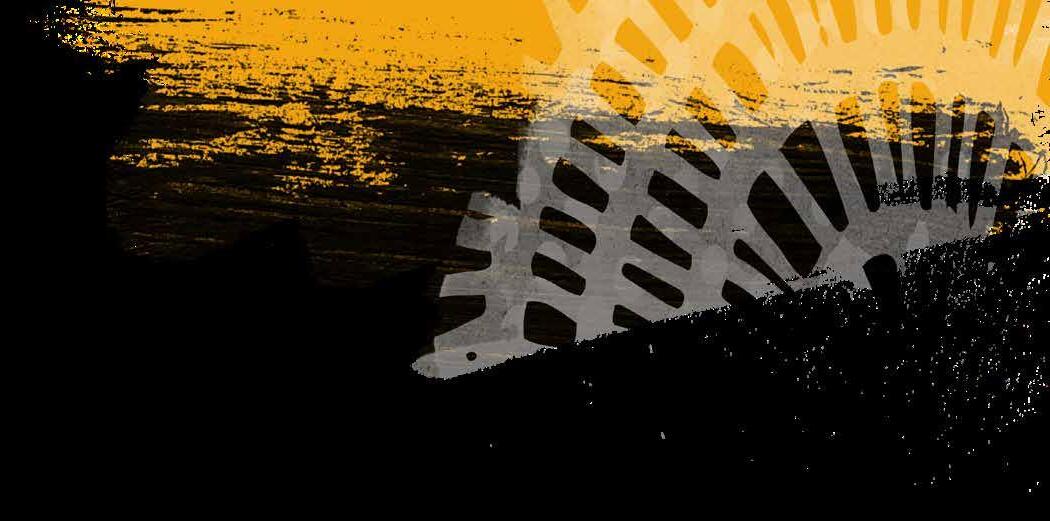
NT Police Commissioner Michael Murphy, who previously claimed there was no systemic racism in Territory police, said: ‘It's absolutely disgraceful and abhorrent, I won't stand for that type of culture in the Northern Territory police.’
The Commissioner also committed to making sure the NT police is a culturally safe competent organisation that people wanted to work for and said that there was an internal investigation with ICAC into the awards.
My state of Western Australia has also had more than its share of police racism, including the 1983 killing of 16-year-old John Pat by several off-duty police officers in Roebourne. Although charged with manslaughter, the officers were cleared of his death by an all-white jury and to this day, Pat's family has never even been compensated – notwithstanding his death was later the subject of a parliamentary apology.
Pat's death led to national First Nations protests and the announcement of a Royal Commission into Aboriginal Deaths in Custody, which made important recommendations that today are still ignored.
Other evidence of racial profiling by police against Aboriginal and Torres Strait Islander people includes a 2020 WA Police Force report showing Aboriginal drivers were 3.2 times more likely to be issued fines from being pulled over than non-Indigenous people, while infringements issued by traffic camera statistics showed no bias against First Nations people.
Four years on, we've heard little to nothing from WA Police, who also snubbed the Senate Inquiry hearing into Murdered and Missing Indigenous Women in Perth last year.
Queensland's racist policing culture was highlighted last year by the release of secret police recordings within the Brisbane Watchhouse which denigrated Nigerians, Muslims, and First Nations people in violent racist language, including one officer joking to his colleague that a female Aboriginal detainee ‘won't give you a f***ing blowjob here’.
While then Queensland Premier Annastacia Palaszczuk found this ‘horrific’ and the Police Commissioner Katarina Carroll promised to crack down on misogyny and racism, not one officer involved faced any sanction.
We are also seeing a failure of governments to ensure accountability and reform of racist policing systems and structures, as is their responsibility.
Police when charged are acquitted of deaths of Aboriginal and Torres Strait Islander people by courts and juries that don't include First Nations people, officers aren't sanctioned for racist abuse and violence, and governments have yet to repeal laws rejected by the United Nations as discriminatory and underlining racial profiling.
Some years ago, when working for the UN in Switzerland, I saw they worked with police across the globe to improve human rights. Although the UN was keen to assist Australia, there was no interest here.
The NT Coronial Inquest must at the least recommend the NT government ensure police implement transformative human rights and anti-racism training, with accountability for racism embedded in reforms.
This situation has historical origins as racist policing was inherent to colonisation and dispossession of Aboriginal and Torres Strait Islander people from traditional lands, with dedicated units known as 'native police' involved in killings and massacres of First Nations people.
Many thousands of Aboriginal and Torres Strait Islander people in Australia died in a war still not recognised but depicted in filmmaker Rachel Perkins docuseries, The Forgotten War, and David Marr's book about his family's history in the notorious native police, Killing for Country. This is a history still denied in Australia, although First Nations people have resoundingly supported truth-telling.
We must all remind the federal government of its responsibilities under the International Convention on the Elimination of All Forms of Racial Discrimination, a binding treaty which requires government address systemic racism, including in policing. We also want to see meaningful progress of the Anti-Racism Framework and the Senate Inquiry into the UN Declaration on the Rights of Indigenous Peoples.
Prime Minister Albanese promised reforms to our people on election night. The Voice referendum vote reflected racism in Australia, a warning bell that should have increased commitment to addressing racism, and respect for Aboriginal and Torres Strait Islander rights.
This article was first published in the National Indigenous Times 26 March 2024 and we thank Dr McGlade for permission to republish. Read more: nit.com.au
23 Issue no. 51 / May 2024
CAN WE HAVE TRUTH-TELLING WITHOUT THE VOICE? OUR RESEARCH SHOWS A WAY FORWARD
Coming to terms with the past?
Identifying barriers and enablers to truth-telling and strategies to promote historical acceptance
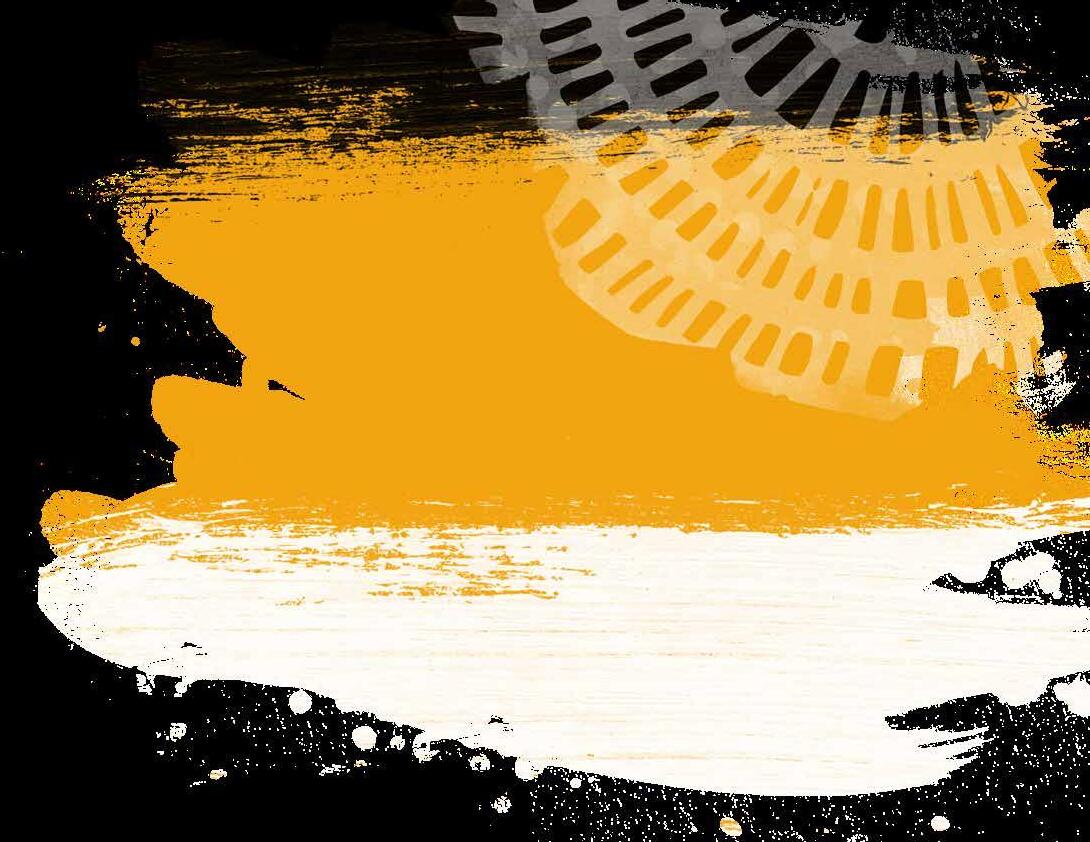
Our recent research, Coming to terms with the past?
Identifying barriers and enablers to truth-telling and strategies to promote historical acceptance finds that while truth-telling is an everyday activity for many First Nations people, non-Indigenous Australians are unsure about what their role in truth-telling might be.
The 2022 Australian Reconciliation Barometer identified that only 6% of non-Indigenous respondents had participated in a local truth-telling activity in the previous 12 months, compared to 43% of First Nations respondents.
This indicates a gap between First Nations peoples' calls for truth-telling as an essential part of transforming the future relationship between them and non-Indigenous Australians, and non-Indigenous people’s knowledge about and interest in participating in truth-telling. It might also indicate a lack of opportunity to participate in truth-telling activities.
Coming to terms with the past?
Coming to terms with the past?
Coming to terms with the past?
Coming to terms with the past?
Coming to terms with the past?
Coming to terms with the past?
Coming to terms with the past?
Identifying barriers and enablers to truth-telling and strategies to promote historical acceptance
Identifying barriers and enablers to truth-telling and strategies to
Identifying barriers and enablers to truth-telling and strategies to promote historical acceptance
Identifying barriers and enablers to truth-telling and strategies to promote historical acceptance
Identifying barriers and enablers to truth-telling and strategies to promote historical acceptance
Identifying barriers and enablers to truth-telling and strategies to promote historical acceptance
Identifying barriers and enablers to truth-telling and strategies to promote historical acceptance
acceptance
Coming terms the past?
The Uluru Statement from the Heart advocates for 'Voice, Treaty, Truth' to redefine the relationship between Aboriginal and Torres Strait Islander and non-Indigenous peoples. However, the recent referendum defeat exposed significant gaps in understanding, both of history and constitutional mechanisms. Professor Heidi Norman and Dr Anne Maree Payne’s new research shows us that truth-telling is more vital than ever on the path to recognition and reconciliation.
Truth-telling
We broadly defined truth-telling as activities or processes that seek to recognise or engage with a fuller account of Australia's history and its ongoing legacy for Aboriginal and Torres Strait Islander peoples. Three dominant understandings emerged from the research, with a fourth category capturing our research findings on the ‘how to’ of truth-telling:
Truth-telling to achieve justice for First Nations people: Usually undertaken on a larger scale and informed by human rights frameworks to address systemic injustice at an institutional level. Examples include the Bringing Them Home Report and the Yorrook Justice Commission.
Truth-telling to promote reconciliation and healing: Occurs mostly at the local and community level under the understanding that relationships and dialogue can create change. Less likely to be tied to formal outcomes or reparations. Examples include memorials, remembrance and reconciliation events.
Anne Maree Payne and Heidi Norman Indigenous Land and Justice Research Group School of Humanities & Languages
Anne Maree Payne and Heidi Norman Indigenous Land and Justice Research Group School of Humanities & Languages
Anne Maree Payne and Heidi Norman Indigenous Land and Justice Research Group School of Humanities & Languages
Anne Maree Payne and Heidi Norman Indigenous Land and Justice Research Group School of Humanities & Languages
Anne Maree Payne and Heidi Norman Indigenous Land and Justice Research Group School of Humanities & Languages
promote historical
Anne Maree Payne and Heidi Norman Indigenous Land and Justice Research Group School of Humanities & Languages
Identifying barriers
truth-telling promote
Anne Maree Payne and Heidi Norman Indigenous Land and Justice Research School of Humanities & Languages
to
historical
Anne Maree Payne and Heidi Norman Indigenous Land and Justice Research Group School of Humanities & Languages
Anne Maree Payne and Heidi Norman Indigenous Land and Justice Research Group School of Humanities & Languages
24 Issue no. 51 / May 2024

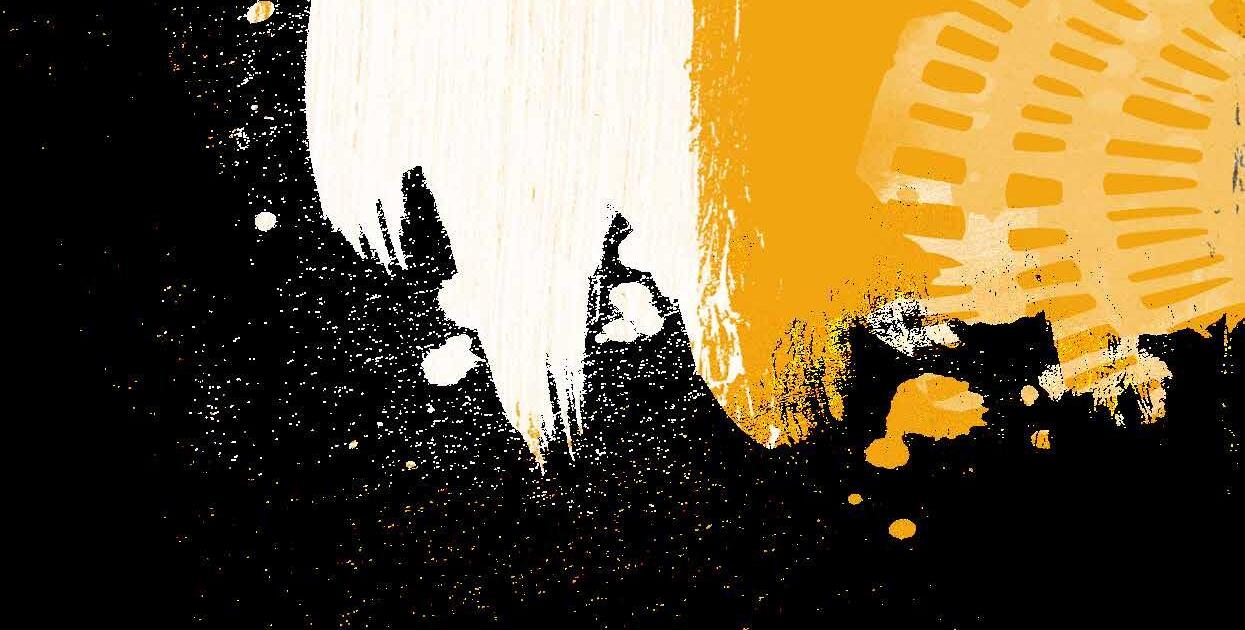
Truth-telling to challenge and change historical understanding: Draws on a wide array of evidence to tell a richer story of history to help come to terms with the past’s legacies and what that means to live in Australia today. Acknowledges that First Nations histories extend beyond the 200-plus years of colonisation to many thousands of generations.
Truth-telling practice: A vital step where more work is needed. The strong consensus from our research participants was that truth-telling must be led by Aboriginal and Torres Strait Islander people and communities. It should engage with First Nations perspectives; recognise the ongoing impacts of the past on First Nations people’s lives today; be ongoing, not a ‘one-off’ event; and aim to achieve change, whether at an attitudinal, institutional or structural level.
While acknowledging the interconnections between these categories, this framework is useful to think about the wide range of initiatives and events currently taking place under the umbrella of ‘truth-telling’. It also helps to distinguish what cannot meaningfully be described as truth-telling.
Benefits of truth-telling
First Nations and non-Indigenous people agreed that the main benefits of truth-telling is developing a shared understanding of Australian history; as well as delivering healing for Aboriginal and Torres Strait Islander peoples; and improving relationships between First Nations and non-Indigenous peoples.
All respondents agreed that truthtelling should involve First Nations people’s perspectives on the past being presented and a large majority agreed that truth-telling should recognise the diversity of First Nations peoples.
Aboriginal and Torres Strait Islander people were highly committed to truth-telling, although less likely than non-Indigenous people to agree that truth-telling might lead to justice for First Nations peoples.
First Nations respondents identified a range of motivations for participating in truth-telling and were more interested in truth-telling about their local community (87%) than nonIndigenous people (67%). 89% were motivated to participate to share their own personal or family history or perspective, compared to only 25% of non-Indigenous respondents.
Barriers to truth-telling
Trauma and the need for cultural safety in truth-telling were significant concerns for First Nations people, who were also significantly more likely to express concerns that truthtelling might emphasise divisions and differences between First Nations and non-Indigenous Australians. They were also concerned that participants in truth-telling might question or challenge the accuracy of perspectives shared.
Non-Indigenous respondents indicated significant uncertainty about how to participate in truth-telling, despite identifying as being highly aware of Aboriginal and Torres Strait Islander history and truth-telling. 38% of non-Indigenous respondents indicated that this would be a barrier to their participation and 26% said they were neutral or unsure. In contrast, only 12% of Aboriginal and Torres Strait Islander respondents said a lack of knowledge about how to get involved might prevent their participation in truth-telling.
There was a degree of uncertainty among non-Indigenous people about what truth-telling involves. Others identified a lack of opportunity to participate in truth-telling.
These findings highlight that communitybased truth-telling initiatives need to include public education about what truth-telling encompasses, as well as practical information about where, when and how truth-telling will be taking place.
Contested truths
Truth-telling is not a universal panacea and as historian Mark McKenna commented in the wake of the Voice referendum, ‘telling the truth is one thing, hearing the truth and taking it in is something else entirely.’
Our research highlights the need for Australians to do more to enable meaningful participation in truth-telling, which must be realistic about its benefits and limits and recognise the diversity among and between First Nations and non-Indigenous participants. It must also acknowledge systemic disadvantages experienced by Aboriginal and Torres Strait Islander people, address cultural safety concerns and provide clear protocols for participants.
Finally, it should build truth-telling and truth-listening capacity among both First Nations and non-Indigenous participants, recognise that truth-telling may involve difficult emotions and the potential for conflict, and have strategies in place to manage these and, perhaps most importantly, maintain hope for a better future.
Read the full report: bit.ly/truth-telling-report
This article was first published on The Conversation. To read more, go to: theconversation.com/au

25 Issue no. 51 / May 2024
LOOK FOR A BOOK!
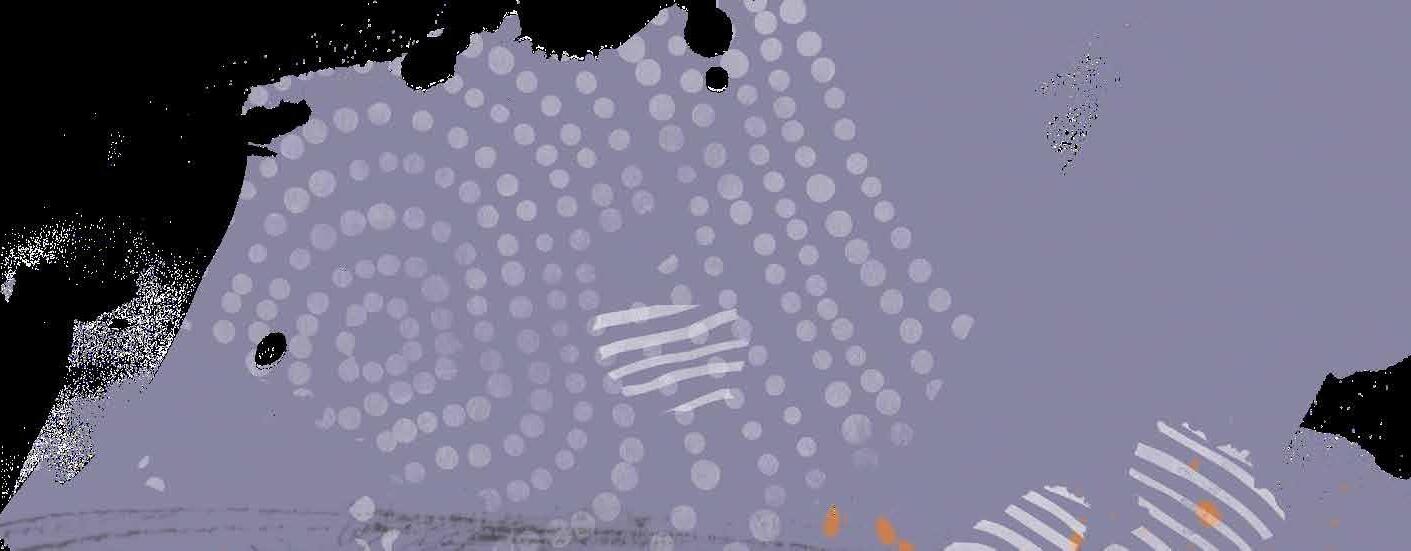
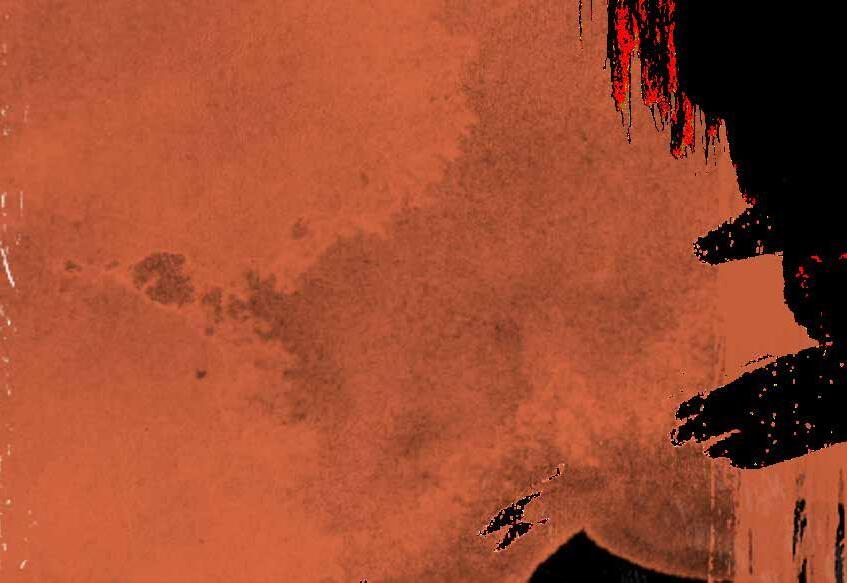

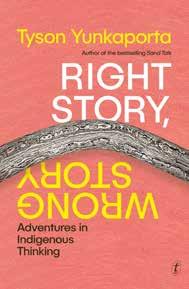
Right Story, Wrong Story
Dr Tyson Yunkaporta
Text Publishing
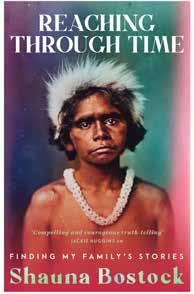
In his introduction to this extraordinary book, author Dr Tyson Yunkaporta speaks directly to his reader: ‘Us-two, you and I meeting in these pages, we are here to find out what is useful and interesting in dialogue.’
Right Story is a conversation between writer and reader about the critical importance of First Nations knowledges and ways of thinking. Looking at just about everything wrong with the world, from environmental collapse to the dysfunctional state of our communities, it uses First Nations knowledge as a lens to view such problems.
Yunkaporta attempts to have the reader recognise the differences between the ‘right story’ and the ‘wrong story’, and to identify the ways that First Nations thinking might turn ‘Wrong Story’ into ‘Right Story’. With writing both elegant and whimsical, however, even avoiding the dense language of academia, it can be difficult for a non-Indigenous reader to navigate the concepts he proposes. This is a book that needs to be taken in slowly and thoughtfully; read a little, think a lot!
Reaching Through Time
– Finding My Family’s Stories
Shauna Bostock
Allen & Unwin
‘This book is my contribution to truthtelling… Telling our ancestors’ stories is a way to address this unfinished business.’
Shauna Bostock follows the threads of her family back through centuries, tracing strands of archival records and oral history to pluck out stories of suffering, courage, conviction and joy. From Nellie Solomon, who kicked the powers at the Aborigines Protection Board; to Sam Anderson, who caught Donald Bradman out for a duck; to the author’s father and uncles who went to Vietnam, then fought on the homefront for Aboriginal rights, art and activism their weapons of choice; to the arrival of the Bostock name in Australia in the shape of a convicted slave-trader, Bostock characterises her ancestors with a storyteller’s flair.
This is a significant book, and as Bostock says, she is the only one who could have written it – Aboriginal Affairs NSW only allows ‘directly related’ people to access materials on First Nations people. But if the richness of experience in Bostock’s ancestry suggests anything, it is that there are thousands of true Aboriginal and Torres Strait Islander stories that need to be told.

Returning Kirli Saunders Magabala Books
Returning is a new collection of poems and artwork by Gunai woman Kirli Saunders, exploring returning to your true self, connecting with kin, Country and queerness, and the ongoing fight for self-determination. Deeply emotional, the collection features an array of artworks in watercolour, digital imagery, weaving, hand-crafted possum cloaks and ink on hand-dyed silk.
Written in the backdrop of the pandemic, bushfires, floods and the global Black Lives Matter movement, Kirli says, ‘the issues that our ancestors and we have been fighting become mainstream (for a time).’
Truth-telling is a motif and Kirli shines an inescapable spotlight on our very real history, listing the countless ways First Nations people’s lives have been impacted by unpaid labour, domestic servitude and abduction from family homes.
Returning is an intimate look into the life and epiphanies experienced by Kirli during times of global and local uncertainty and loss, and what was found among the wreckage.
26 Issue no. 51 / May 2024
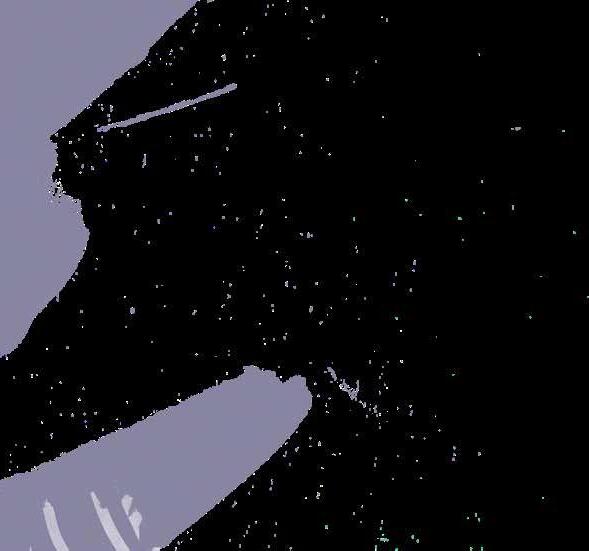

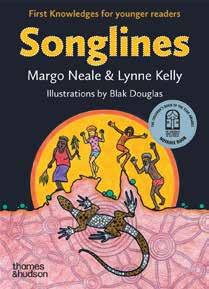
Songlines - First Knowledges for Young Readers
Margo Neale & Lynne Kelly –Illustrations by Blak Douglas
Thames & Hudson
‘Let’s walk together through the oldest, biggest library of knowledges on earth. This library is not made of books. Its knowledge is held in the land, the sea and the sky… We call the knowledge held in this enormous library the Songlines.’
Songlines is a young reader adaptation of the popular First Knowledges book series that delved into Aboriginal and Torres Strait Islander design, innovation and astronomy.
Written to explain how knowledges were and continue to be shared through the ‘world’s oldest library’, Songlines is an immersive and engaging introduction for young readers, with striking illustrations from award-winning artist Blak Douglas.
Both authors bring a wealth of knowledge and insight into the topic. Margo Ngawa Neale is the head of the Centre for Indigenous Knowledges, senior Indigenous curator, and principal adviser to the director of the National Museum of Australia. Lynne Kelly is a science writer working as an honorary research associate at La Trobe University and the author of The Memory Code and Memory Craft
Each chapter ends with a chance for young readers to get involved in their learning by taking part in activities that deepen their knowledge and help them understand the Country they are on, what they can learn from it and the Songlines around them.
An engaging read not just for young readers, but for parents, caregivers and grandparents, too.
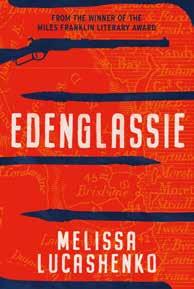
Edenglassie
Melissa Lucashenko UQP
Weaving together narratives of two different Meanjin-Brisbanes, Lucashenko’s Edenglassie provides an Aboriginal viewpoint to the upcoming bicentenary of John Oxley’s trip up the Brisbane River. It shows a tantalising glimpse of what could have been – when convicts were no longer being sent to the area, and populations of First Nations people and foreigners were close in numbers.
We first meet our protagonists – Dalapai, Yerrin Murree, Dawalbin, Mulanyin and Nita – in the early 1850's at a ceremony at the Woolloongabba pullen pullen grounds. Yerrin expects the white strangers will be gone by the next mullet run, but colonial violence ramps up, land is being taken at a pace, and the river eco-system is ruined.
In the present day, feisty and funny Granny Eddie, her granddaughter, a young doctor who’s just started identifying, a healer/Aunty, and an annoying white journalist are the characters that help build the connections to past and present, as history, ways of knowing, being and learning, are wrangled between their lives.
This story has been on Lukashenko’s mind for years, but she didn’t start writing till she was back in the city and with the advice of Elders: ‘I wanted have novel out there at the bicentenary of Brisbane that says, this is one version of what was happening at the birth of what’s now Brisbane,’ she says. ‘And if you don’t understand there was a civilisation here, there was government here, and that there were people with flourishing lives here and complex lives then have a read of this and maybe you’ll think differently.’
27 Issue no. 51 / May 2024

JOIN US IN SONG DURING NATIONAL RECONCILIATION WEEK 2024
We once again invite choirs and singing groups from all over the country to raise their voices in support of National Reconciliation Week 2024.
The 2024 song is the great Australian anthem Warumpi Band. The song urges all of us to work together and to stand up and be counted “no matter what your colour.”
Now more than ever, we need to tackle the un nished business of reconciliation, the ght for justice and the rights of Aboriginal and Torres Strait Islander people will
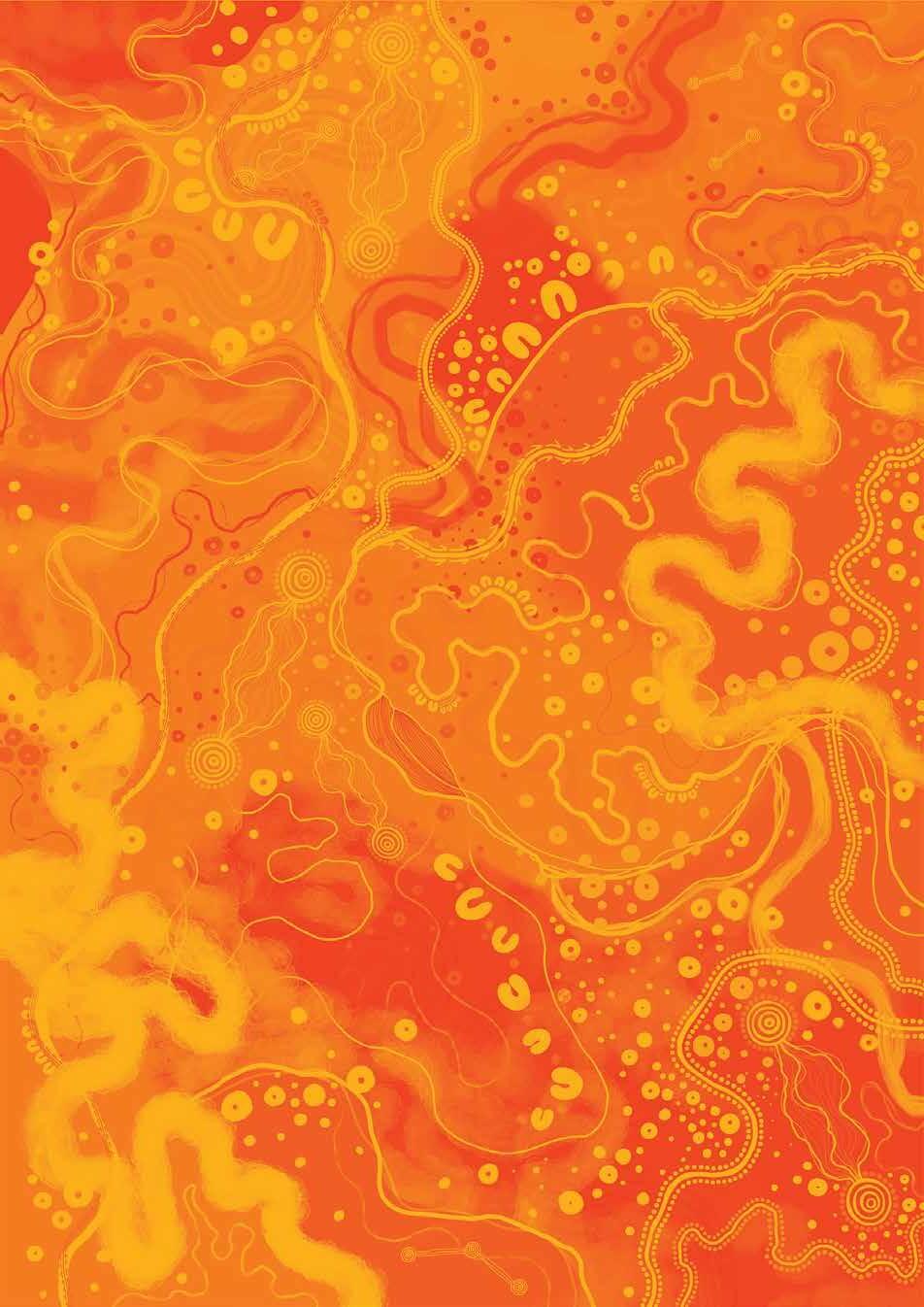
Come and sing Blackfella/Whitefella
Register your choir or group and grab a free arrangement and backing track.
Practice up and belt it out during National Reconciliation Week 2024.
Add your voices for reconciliation. Louder than ever.
FOR MORE INFO AND TO REGISTER, SCAN THE QR CODE














































 Jacara Egan is a Change Our Game Ambassador, advocating for more First Nations women across all levels of sports. Photo: Phoebe Powell
Jacara Egan is a Change Our Game Ambassador, advocating for more First Nations women across all levels of sports. Photo: Phoebe Powell








































